#its the intentional ignorance of the trauma that defines his character for me
Explore tagged Tumblr posts
Text
Astarion is one of the first characters where I love him so much and cannot fucking stand the fandom's take on him. I cannot go into the astarion tag or I will be filled with an unspeakable rage
#its the intentional ignorance of the trauma that defines his character for me#as an ace person who hates being sexualized and hearing a specific line from astarion where he literally tells you it makes him#uncomfortable when people sexualize him thats so relatable and the way the fandom glosses over thar bc sexy vampire twink is sooo annoyinh#like do ppl have no critical thinking skills? i know hes just a character but ppl literally fall for his act and even after he admits#that its just an act they still pretend thats his actual personality/preferences like? hello?#idk man it just irks me to my soul that someone might say 'i dont like sex or being thought of sexually' and ppl just ignore that to place#their own fantasies over the wishes of another. as an ace person#that makes me so nervous like 😅#ranting
17 notes
·
View notes
Note
Do you think making villians in fiction to be too charismatic has the effect of normalizing fascists and other psychopaths in real life? Like making those assholes play into how evil they are in some post-ironic way? I could imagine the Muskrat photoshoping himself reviving the 2024 Trump campaign with his money or something if Soul Eater was popular enough and all the bigots repost it while screeching "based"...
This is going to be a lot of rambling and not pleasant reading that goes on so long, so I'm going to put the "Read More" here.
I have been listening to a podcast that goes through the history of the English language, and they got to explaining how "villain" actually emerged in part from economic details: the word is related to "village," to imply someone undesirable, from a lower economic class.
For all the whining I do that the League of Villains was not as well developed as a set of characters as I would like, where I think the societal problems contributing to the characters' choices and actions were not as well defined as Horikoshi should I have done, after hearing that podcast, I do have to give more credit to the coincidence or intention on Horikoshi's part to use that word "villain" to get back to its roots and to add something that the tired "villains are for progress, superheroes just uphold the status quo" argument that many people (admittedly, including me) have repeated so often that it is hackneyed.
All of that is to say, no, I don't think making villains in fiction charismatic has normalized fascists--at least, not only.
Returning to the hackneyed argument, that supervillains disrupt the status quo: Killmonger did not lead to normalizing fascists, Shigaraki did not lead to normalizing fascists. At worst, these stories turn people against Democratic candidates because of a bad assumption that those Democrats are not going far enough, hence leading to apathy because they don't do what Killmonger does or what Shigaraki does--which is fucking stupid, because there is no way a responsible candidate for office would ever do what Killmonger does or what Shigaraki does, get the fuck out of here with that nonsense. But no, those stories do not inspire someone to vote Republican.
I think poorly written villains can normalize fascists: I think Disney fucked up with Kylo Ren and doesn't understand why that doesn't work where Vader works. (I say this as ignorant of so much of Star Wars, not being a fan, and really not wanting to wade into how, while Vader works, Anakin still does not, regardless how well Lucas was responding to W-era fascism and inadvertently predicting or just noticing how fascism preys on disaffected young men with trauma or just an annoying sense of entitlement. And it's not to ignore any basis of reality that you get a How I Met Your Mother situation where a dumbass thinks Vader was the good guy.)
But as I said above, right now, at this moment, I don't think villains like those in My Hero Academia normalized fascists. I am almost certain I have written such an argument before; now, though, going through the story again, I'm not convinced, because the manga did end with all of the work by Shigaraki, Toga, Dabi, and others really not leading to a better situation for any of them. While they are not tragic heroes, they are indeed tragic--the story to me is more that they are not charismatic so much as pawns in other people's plans (All For One, those jackasses manipulating Spinner) or brought it on themselves (Dabi, not ignoring Endeavor's bullshit).
Also, I cringe at hearing "charismatic," not because you said--but because it is such an empty word. It just means having charm or appeal, which is too vague. There are idiots who flat-out say this orange Nazi is charismatic, charming, kind, personable, funny--no, no, no, no, Jesus Tap-Dancing Christ, no: he is not appealing, he is ugly down to his soul, he lacks any comedic timing, he is whiny and boring and repetitive, he's a pull-string doll where every insult is the same set of words and dull catchphrases, he is dumb, he has the vocabulary of a rabid groundhog and the mental stamina of a twig, he treats people poorly, he does not act like a person or a human, he is just garbage, a puppet of Putin and oligarchs.
How the actual fuck is Shigaraki a more appealing villain than him? Even when we know this orange fucker had a bad childhood, he still turns out to be not sympathetic but even more grotesque because he didn't learn to be better than his parents, he decided to be even worse.
It's why all of those editorial cartoons post-2015 featuring supervillains alongside him are so gross: sorry, but Dr. Doom, Magneto, and others they are smart, they are charming--he isn't. (And as I'll point out later: there is no way Doom or Magneto would hang out with a fucking Nazi--what the hell are these cartoonists thinking?) It's why Young Justice having Lex Luthor quoting and imitating this orange Nazi is so stupid: what an insult to Luthor, someone with an actual brain.
I mean, for fuck's sake, a PBS children's cartoon, Wild Kratts, based one of their animal-kidnapping environment-destroying villains on Muskrat. Back in 2011 Wild Kratts already figured out this prancing jackass was a villain. There were so many people cheering this sack of shit online long before he really took the mask off and showed his Klansmen attitude. And around 2011, I was looking at how many people were hanging on Muskrat's every word, and all I could think was, "God, you're dumb," and started unfollowing those people. (Sorry, [certain unnamed anime dub actor], but praising Muskrat around 2016 is why I unfollowed you online. Glad I never got you to sign my Soul Eater DVD--dodged that bullet. Wish I had avoided Mignogna signing it, but that's my mistake.)
But to actually address your question:
I get the point that playing as the villain is supposed to command coolness. I am almost certain I have written elsewhere before that it is creepy at times to see people cosplay as villains, in particular (going back to Star Wars) Stormtroopers, given that Lucas was pulling from Nazi imagery to make it clear that these people are creepy and the bad guys. That being said, as I pointed out with the League of Villains, it is not all about leaning into "villain is cool" so much as "villains are human." People like this orange Nazi and Muskrat do not play as villains to show their humanity; they lack humanity and want to be Nazis. Even the Joker hated Nazis like Red Skull; this is why I was appalled with the editorial cartoons putting this orange Nazi alongside Dr. Doom and Magneto when, for what should be obvious reasons, no, those two would despise this fucking orange Nazi. It's why you can't say "don't show villains in stuff, because then you normalize it" is a poor argument, even as I have said that a lot of art does normalize this shit.
As an example: I grew up on The Lion King, I was not bothered by the hyenas doing literal Nazi goosestepping while Scar is literally in a Hitler pose--I understood, even as a kid, we are showing them as such to telegraph they are the fucking bad guys because anyone should know that the Nazis are the fucking bad guys.
But at some point, that argument went away. Maybe it was when that one classmate I had in college was impressed with Nazi uniforms--and I was horrified. Or probably around Kickassia because of course Doug Walker had to do that stupid gag. Or even Hellsing not doing enough Nazi punching. Or just all of South Park. Or, most likely, because we ignored the history of World War II, the Holocaust, the violence and hatred against Jewish people as well as LGBTQ+ people, Roma people, so many victims of Nazi fascism. How many books on the Holocaust I read in grad school, just about one per semester--and my failure, when reading those, to appreciate the warning they were sending, because I thought we were getting better, that we did learn--and, obviously, no, not all of us learned.
Now we have orange Nazi and Muskrat embracing Nazi iconography because their base is made up of Nazis who wrongly think Nazis are cool--this is the mess we are in. But that's not because any Nazi are charismatic (because, again, "charisma" is a bullshit word), but because those people are that awful. Jesus, how did we go from Captain America punching Nazis to the owners of Marvel handing over millions to this orange fuck. I guess it must be because a lack of media literacy: someone can find Scar "cool" and "charismatic," but I would hope they would also realize, "Wait, why is he posed like Hitler? Oh, because he's a dummy! And that's why he fucking dies at the end--because he's as dumb as a Nazi."
Onto your next point: I doubt Muskrat would do that photoshop (since he would just steal it from someone else, or use AI--which is the same as stealing from someone else). It's not like there aren't options: years ago some Nazi put the red hats onto the Soul Eater NOT trio, because that is how sick our world is, turning those anime characters into the modern day brownshirts. I hate to say it this way, I should be glad Soul Eater is not as popular as it could be, because, despite that awful Nazi photoshop I just mentioned, I rarely ever see people in this fandom cater to literal Nazis--and if it did get popular, yeah, Muskrat or some other freak would use it for their iconography. I mean, pick the most popular fandom, there have been awful people weaponizing that fiction to promote their bigotry.
And I remain steadfast in my belief that the vast majority of people know the orange Nazi and Muskrat are just complete losers: no amount of times on Saturday Night Live (which, what loser goes on Saturday Night Live anyway), no amount of social media networks to buy, no amount of video game playing or collectible buying or photoshops can buy friends, good will, and coolness--because every last one of their followers is a coward who will abandon them as soon as they inevitably get hurt by their weakness, stupidity, and incompetence. They have no friends, only spineless sycophants; they have no good will, they just have people who want someone to hate; they are not cool, they are the such losers (who can never win a fair election).
0 notes
Text
I am back on my Wandavision bullshit! I am rewatching the show and there is so much that us bothering me with the framing of Wanda and her actions. It would be something if this was a phenomenon that was unique to this show, but I dont think it is. It is a small reflection of society and how we treat white women in relation to depression.
I am going to compare Wanda and Tony again. I am comparing Wanda and Tony so heavily because they both have well defined canon depictions of mental illness. Hell, Tony is even featured a psychology textbook as an example of PTSD in media. While Bruce and Thor also have mental illnesses (depression, suicidal ideation)they are not focused on as heavily or as seriously(which is a shame).
The treatment Wanda and Tony get in the narrative of the mcu are pretty different. Tony is constantly reprimanded for his behavior. He faces some sort of consequence in almost every movie, even if he has a mental health issue. And while his progress is shaky at times he always tries to do better. A big part of Tony's character is redemption. Even if you personality think that Tony should be punished more harshly, the point still stands that he is criticized in the narrative. The intention is there.
I would go so far as to say that sometimes the mcu is harsh to Tony when talking about his PTSD. His mental illness being outright ignored by teammates or the people around him for a long time. I totally remember in Iron man 3 when Tony tried to talk with Bruce about his issues and he was sleeping. It was supposed to be funny that he was highly disinterested. A lot of people are annoyed with Tony's PTSD rather than concerned. It doesn't matter if Tony is likable or not, that is not okay. And even though Tony saved the world and is hailed as a hero at the end of his story, it is important to remember that he is dead and his death was kind of framed like it saved him. Pepper says that he can rest now. That is clearly a reference to his mental health struggles. And I dont love that. Not at all, especially with the rates of suicide for people with PTSD. I have PTSD and that is a thought that haunts me constantly. That death is the only way my mind will relax. I am sure that the writers didn't intend for his death to come off that way, but I dont know. It feels squicky to me.
Wanda on the other hand isn't held responsible for her actions. She is downright coddled. She is presented as younger than she actually is in civil war. POC characters that she has tried to actively kill make a thousand of excuses for her, and even say that they would do the same. The POC people that she has killed( Johannesburg and Wakandan citizens)are pushed aside and ignored. She abuses Vision and it is not addressed. When he walks down in his retro outfit and she all fucking gleeful that he is going along with her whims, and then he states that it was the only thing in the closet; absolute chills. Wanda knew what she was doing to the poor people of Westview. She might have not known at first but she caught on pretty quickly. Wanda is the villian Wandavision, even if the narrative doesn't want her to be and tries to distract you with Agnes. Agnes was just piggybacking off of Wanda's creation. She didn't create this nightmare. Agnes is only the big villian because she is opposing Wanda. Wanda is framed as the absolute victim so much, especially in this show. God, when Monica says to Wanda" they will never know what you did for them" I wanted to chuck my remote. WHAT?! She tortured them. Made them her dolls to play house with. She did nothing for them except give them trauma and uprooted their lives. The people of Westview are even presented as threatening and unreasonable at the end of the show, with them looking at Wanda and she looking small in her hood. Ugh, it so nauseating. I'm sorry, but the accords never looked so good right now.
There could be many reasons for this difference in treatment. I think one of the big ones is because Wanda is a white, skinny, traditionally pretty woman; and they are the face of idealized sympathetic media depression. I would even say that Wandas depression is treated with more care than Thor's and Bruce's. And PTSD is not understood very well. It flip flops back in forth between the" scary" illnesses( bipolar, schizophrenia, personality disorders), which leaves it in this realm of misunderstanding. There are actually a lot of people who don't even know its an anxiety disorder.
156 notes
·
View notes
Text
the heart of the matter (is Leonard McCoy)
Followers...friends. I come to you today, hat in hand, to ask for your support in a certain fandom matter, a trifling concern of little real consequence which nevertheless has been driving me absolutely cross-eyed bonkers for some years now.
Simply put: can we please all agree that Bones is the heart of the Enterprise???
In AOS, I mean. I’m not aware of any debate over this when it comes to TOS, where the roles of the triumvirate have always been explicit, though there are a few different ways to identify them:
Spock = logos = superego = head
Bones = pathos = id = heart
Kirk = ethos = ego = soul
So clear! So clean! So universally accepted by Trek fandom at large!
Oh, but things get murkier in AOS, and there are plenty of posts floating around which suggest that it’s Kirk, not McCoy, who serves as the heart in the Kelvin timeline. Even the writers of the first two AOS films have outright stated that their interpretation of the triumvirate had the original roles switched, with Kirk as the highly emotional one and McCoy as the arbiter between Kirk’s passion and Spock’s logic. It’s true that this technically counts as a Word of God pronouncement by the actual creators of 2/3 of the series thus far, which some would argue renders it canon. However, it’s equally true that those same creators also felt that Kirk was a fuckboi and that Benedict Cumberbatch wonderfully embodied their vision for Khan Noonien Singh, so honestly, who gives a hot hollerin’ fuck what those dingdongs think. This seems as justified a time as any to invoke Death of the Author, and in fact, it’s my firm belief that despite the writers’ intentions, Star Trek and Into Darkness both support the original triumvirate breakdown.
Under the cut you’ll find a long-winded and self-indulgent ~*~character analysis~*~ of the Kelvin-timeline incarnations of Jim Kirk and Leonard “Bones” McCoy, reviewing why Leonard is still unmistakably the heart, unpacking what the hell Jim’s deal is, and finally taking a look at some key examples from canon, because ya girl believes in showing her work.
Let’s get down to business.
[A quick warning, as this is starting to spread beyond my own followers: if you don’t like McKirk as a romantic pairing, you ain’t gonna like part IV, so I’d bow out before then or just take your leave now.]
i. Leonard
Independent of Jim’s characterization, it should be blindingly obvious that Leonard is the heart. He’s by far the most nakedly emotional of our seven core crew members, a trait we see writ large and small throughout the films. He’s reactive; he’s passionate; he’s humane. He cares, first and foremost.
Not about Starfleet, of course. Leonard doesn’t give a damn about playing the game or advancing his career, or even really about the Enterprise’s mission - he has no desire to explore strange new worlds, he’ll pass on seeking out new life and new civilizations, and he spends half his time trying to convince everyone else that boldly going where no man has gone before is a great way to die horribly. Fuck exploration, fuck space, and fuck the Federation while we’re at it. Leonard is perhaps the most improbable of the Enterprise’s senior officers for the simple reason that he seems to resent everything about the job.
Well. Almost everything.
See, what Leonard cares about is people. He cares about their lives, about their stories, about their hopes and dreams, about their suffering. That’s why he entered and has stayed in an extremely taxing caring profession, and it’s why he’s still on the Enterprise despite his incessant bitching about everything they do. He wouldn’t trust anyone else to take care of the crew he’s become so attached to, and he finds fulfillment in helping the people they encounter out there in the nightmare of space.
In every timeline, Leonard McCoy defines himself by what he can do for others: the pain he can ameliorate, the wounds he can heal, the diseases he can cure, the small amounts of good he can bring to a galaxy filled with so much absolute horseshit. Unlike most of his colleagues, he’s not motivated by curiosity or an adventurer’s spirit or a burning desire to make sense of the universe. (Fuck the universe, too, as a matter of fact.) Instead, he’s driven by the incredible depths of his compassion and empathy and concern for the people he serves alongside and those they meet along the way.
Sure sounds like the heart to me.
ii. Jim
I actually totally get why some people characterize Kelvin-timeline Jim as the heart. He’s quite literally a different man than the original timeline’s Kirk, and he definitely has more of the pathos qualities to him. Early on, he’s a total spitfire, fierce and hot-blooded, quick to anger and other sharp-edged emotions we’re not used to associating with James T. Kirk. Even as he grows into himself and leaves some of those traits behind, he remains spontaneous, passionate, protective, and self-sacrificing - easy enough to mistake for the heart if you squint.
But let’s not confuse having a heart for being the heart. Sure, Jim is more openly emotional and reactive than his TOS counterpart, but there’s still a marked difference between the way he and Leonard express and act on their emotions.
AOS Jim definitely has a lot of feelings - big ones - but at the end of the day, he’s not driven by his heart. He’s driven by his gut.
Whenever there’s trouble, Jim makes a beeline right for the center of it. He’s impulsive as hell, rarely pausing to think past his first instinct, because he just wants to be doing something, no matter the odds, no matter what it costs him. He explicitly calls himself out on this in ST:ID when arguing with Spock: “I have no idea what I’m supposed to do. I only know what I can do.” He doesn’t have the patience or the constitution to sit and debate all the options, either internally or with his crew. If there’s a path forward from where he is, even a bad one, Jim’s gonna take it.
[Sidebar: One could make the case that the roots of Jim’s instinct to act reach back to his childhood traumas - canonically ignored abuse and neglect on the one hand, and the Tarsus IV famine and massacre on the other - but that’s a whole post on its own and we ain’t got all day here.]
Jim can’t not act, and while that gets him into a lot of trouble, it also saves lives. Sulu probably appreciated that Jim’s gut drove him to leap off Nero’s drilling platform without a moment’s hesitation after a man he’d only just met. He may have been a real shithead about it, but Jim’s impassioned insistence on going after the Narada and not wasting time on the possibility of a better option was key to saving Pike and Earth itself. And I don’t know why Spock was so surprised that Jim intervened to save him on Nibiru, considering that the reason they were there in the first place was because Jim couldn’t sit back and watch the Nibirans die when there was something his crew could do to help them, even if it meant risking a violation of the Prime Directive.
Jim is a good man with a big heart, and he cares about people, absolutely. But he cares most of all about Doing The Right Thing - which in the heat of the moment often translates to Doing Something, Anything, Hold My Beer.
iii. heart vs. gut (i.e., time for some receipts)
I think one of the main reasons Leonard and Jim’s characterizations get confused is because they both tend to act on instinct, only lightly informed by higher reasoning. However, I’d argue that their motivations and the nature of those actions are super distinct, and those distinctions remain relatively consistent throughout all three films. (And y’all know I really mean this shit if I’m out here calling ST:ID consistent.)
Jim is a big picture guy, figuratively and often literally heaving himself full-body into the mix of whatever problem the crew has encountered for lack of any better alternative. That energy propels the plots of all three films: the chaotic path he carves through the events of Star Trek and ST:ID, and the slightly calmer but still undeniably bananas course he charts for himself and his crew in the second half of Beyond.
As the heart, Leonard operates on a more micro level. His concern invariably lies with the individual people caught up in those grand events Captain Chaos is busy dragging them all through. While Jim’s zooming around flipping plot switches, Leonard can always be counted on to bring it back to the personal.
We frequently see this juxtaposed right there on film. Think of that slow pan through medbay in the first movie after the Narada’s ambush and the destruction of Vulcan: while Jim is stewing over what to do about the Big Bad, Leonard has stepped into the CMO role without fuss or fanfare to care for the wounded crew and traumatized survivors.
Or jump ahead to Beyond: during Krall’s attack on the Enterprise, there’s a gorgeous cinematic shot of Jim sprinting down the corridor with two crew members to take on the invaders - and then we cut to Leonard moving slowly through those same ghastly red-lit corridors, searching for casualties in need of help, visibly affected by what his scanner is telling him about the downed crewman he tries to save.
Actually, Beyond as a whole does terrific justice to each of their roles. (Perhaps because it was not written by dingdongs.) The first act finds Jim flailing around for a sense of purpose and forward momentum - an understandable consequence of a gut-driven character having stalled out for too long - and he ultimately gets his mojo back by spending the rest of the film careening through one insane seat-of-his-pants ploy after another. Meanwhile, in the quieter moments between all the mayhem, Leonard serves as the empathetic sounding board for both Jim and Spock as they struggle with deep emotionally charged secrets and Big Life Questions, helping them untangle their feelings and reminding them of the emotional attachments which are ultimately key to their respective decisions to stay on the Enterprise.
More examples, you say? Don’t mind if I do!
Star Trek
GUT: Jim hurtles around the Narada, improvising almost every step of the way and paying the price for his and Spock’s scheme in bodily harm, and ultimately succeeds in rescuing Pike. HEART: Leonard calls out for Jim as he runs into the transporter room, overwhelmed with relief that he’s made it back, and takes Chris Pike’s weight literally and figuratively onto his own shoulders to begin healing him while Jim runs back off to the center of the action.
Star Trek: Into Darkness
GUT: Jim argues with Leonard, Spock, and Scotty in quick succession as he’s preparing to drag them all off to Qo’noS, immune to their attempts to reason with him because, unraveled as he is by grief and pain, he can only focus on his visceral drive to Do Something. HEART: Unlike the others, Leonard is upset not about the larger moral questions of whether it’s right to go after John Harrison or bring torpedoes aboard the ship, but about the fact that Jim himself is hurt and hurting and won’t accept help.
GUT: Jim makes a snap decision to sacrifice himself by hurling his body against the warp core to realign it and save his crew. HEART: Shellshocked by the emotional grenade of his best friend’s death, Leonard suddenly realizes, through the haze of his own numbness and upswelling grief, that he might still be able to do something for this lonely radiation-ravaged body he’s been brought and the life it represents.
Star Trek Beyond
GUT: At the tail end of an improvised plan to out-maneuver Kalara, Jim quite literally shoots first and asks questions later, igniting a fuel tank and setting off an explosive series of events which he and Chekov just barely escape. HEART: The next time we see Leonard, Spock is opening up to him about Ambassador Spock’s death and his own plan to leave Starfleet for New Vulcan - and while he’s empathetic toward Spock (I can’t imagine what that must feel like), Leonard’s thoughts go immediately to the emotional impact of Spock’s plan on the other people he’s closest with. (I can see how that would upset [Nyota]. / I can tell you, [Jim]’s not gonna like that.)
GUT: Jim frantically strains to reach the final switch in the life support hub, believing that he’s going to die either way since the vent has already opened, but spurred on by the knowledge that his ability to move that switch is the only thing standing between Yorktown and annihilation. HEART: Knowing exactly what’s at stake, with the fate of the station and millions of lives hanging in the balance, Leonard’s greatest concern is that Jim won’t make it out in time.
iv. never bet against the heart
Let’s wrap this up with a deep dive on one of the absolute best examples of Leonard as the heart: his decision to sneak Jim onto the Enterprise in the first movie.
As relentlessly as I drag him for the, you know, poisoning and kidnapping aspects of that whole deal, there’s no denying that it is a god-tier heart move. Is it logical? Absolutely not. Is it really the right thing to do for either himself or Jim, as far as he knows at the time? Nope. It’s 100% the wrong choice for his own job security, reputation, and relationships with his fellow crew, and it’s almost guaranteed to get Jim into even worse trouble. Leonard is a smart dude who must understand that this course of action will likely end up coming back on them both in a real bad way. For someone who argues loudly and often in defense of self-preservation, this is a shockingly bad idea.
But none of that matters, because Jim shakes his hand and tells him to be safe with that horrible empty-eyed smile, and it gets him right in the heart, one-two-three.
One: sympathy, worry, and affection for Jim - his best friend, his wild and troublesome stray, his only family.
Two: guilt over adding onto Jim’s pain, and the instinctive urge to fix whatever‘s hurting him.
Three: fear of heading out into the unknown by himself, the agonizing uncertainty of not knowing what’s coming, craving for the security and reassurance Jim’s presence would give him.
“Dammit,” Leonard says, as his heart wins out over his brain. He knows this is a garbage plan, and he doesn’t care. His heart chooses Jim. That’s all that matters.
So he goes back for Jim, and to his own surprise it turns out that this Very Bad Idea was actually a Very Good Idea because Jim’s impulsive instincts end up saving Earth, and Leonard’s not in the habit of fixing what ain’t broke so he figures he may as well keep on chasing Jim’s crazy ass around the galaxy for a while, through jungles and off cliffs and into the goddamn afterlife when need be, until finally one day Jim’s gut drives him right into Leonard’s arms and he suddenly realizes that this is what his heart was choosing all those years ago: Jim’s wide terrified eyes, Jim’s voice breaking over his name, Jim’s hand pressing hard against his chest, reaching out for what’s his.
But that’s another story.
#mckirk#otp: bedside manner#fic related#palimpsest verse#@animetrashmuffin is a gift#several people messaged me when i vague-tagged about this a while back#but you're the one who had to listen to me rant at great length about this while i was sick so CONGRATS PAL THIS MESS IS FOR YOU#mccoy#kirk#star trek#aos#long post
248 notes
·
View notes
Note
how do i ignore all the misogyny in the witcher books? they're much better than the netflix show storywise but there is so much gross stuff compared to what i usually read/watch
hi!! thank you for the ask, this is a very important topic to address, though i believe you are asking the wrong question. the matter is not how to ignore the misogyny in the witcher and other pieces of media, but rather how to confront it and face it head-on.
i don’t believe in making excuses for the media i consume when it has “problematic elements” to it. this isn’t meant to be taken as an excuse to “consume anything you like,” because i would not engage with something insidious in its nature (such as media that revolves around and is based upon harmful stereotypes or insensitive jokes and cannot exist without this, some examples of this are infamous things that i’ve seen discussed on this site like captive prince, cmbyn, and hazbin hotel). instead this is about when a piece of media is good overall in nature (the witcher has many anti-war, anti-violence, anti-imperialist themes and messages relating to family, childhood, friendship, and love) but has elements that are the results of the author’s personal biases.
i think before i address how to deal with the misogyny, i’ll actually define what misogyny exists within the witcher books, to be more specific about what we are talking about, and also to do the work of addressing the misogyny in the books:
how the women in the witcher are treated as characters and how they are depicted by the author.
there are a few good points in this subject. characters such as yennefer and ciri are very strong characters who receive a lot of development over the course of the series, and are main characters that are integral to the plot. they demonstrate both strengths and weaknesses, virtues and vices. they have depth and are not one-dimensional characters, especially as they become more and more complex over the course of the series.
blatant sexualization of women when it’s inappropriate or irrelevant, descriptions of female characters’ looks or bodies that male characters would not have received.
bizzare standards for what is beautiful for a woman, including body descriptions (“triss’s waist measured 22���) and extreme focus on youth and the age cusp of around 15 to 18 as being the most attractive for a woman (stated in-universe, even though this could be excused as being what is normal in the 1200s, keep in mind that this is the author’s decision to impliment this standard into their society).
descriptions and scenarios of extreme violence towards woman that are gratuitous in nature and do not add to the story or have any relevance. (geralt being paralyzed with his knee during the stampede at the refugee camp in bof is NOT on the same level as yennefer being extremely tortured at stygga or ciri meeting “forest gramps” in lotl). some of this violence towards women is related to the male antagonists being misogynistic (such as leo bonhart) but a lot of it is just pure filler and is not necessary for the story.
majority of female characters do not get the depth they deserve, and some are pretty one-dimensional. the sorceresses are a good example of this, as the majority of them are shallow and manipulative. female characters are also just generally not given as much “page time” as male characters, for example compare how much depth and backstory regis and cahir receive to how much milva and angouleme receive. regis’ backstory is entirely irrelevant to the main plot but it’s extremely long, and angouleme’s backstory is more relevant to the main plot (she was born of cintrian nobility) yet it is extremely short. (one could make the argument that this is an effect of their characters because regis talks a lot and angouleme is still processing her trauma, but more could have been given to angouleme even if she is not extremely talkative).
the only canon lesbians in the witcher are not good people and are manipulative in nature, and the only canon f/f relationship (ciri/mistle) is representative of a turmultous, vicious time of violence, and is based upon sexual assault.
the gender non-conforming female characters who ARE good people,never have their gnc-ness treated with any depth, and it is insinuated that they are heterosexual.
male protagonists such as geralt and dandelion are both misogynistic at various times in the books, especially in the short stories. this is unlike when male antagonists are misogynistic, because it is represented as something wrong and is intended to characterize them as vile people. instead, geralt and dandelion say or do misogynistic things and it is treated like a joke or something normal, and not a flaw or something repulsive.
how to confront all of this?
the first step is to address it, just as the above list does, and discuss things that stood out to you and are definitively wrong, that the author should not have put in the story because it is useless and only serves to further misogyny in the real world. it would be a grave mistake to think of these things as “fine” and continue to view the witcher books as some kinds of perfect scripture. so many people feel that just because they enjoy something, they are not allowed to critique it and discuss parts of it that are uncomfortable or plain wrong.
to continue with this point, i think it is important to put the witcher into context as a fantasy series written in the 1990s by a white man who did not (to my knowledge) intend this series for such a broad audience and franchise that it has become. this is not an excuse for sapkowski at all, but rather i think it’s important to understand the origins of the witcher and how it came to be in the first place. this wasn’t a series made to be inclusive and diverse, it wasn’t intended to be “for us” in the first place.
i do not believe that there is MEANT to be any “positive representation” in the witcher because i don’t believe it is something that sapkowski was actively considering when he wrote the books. just because there isn’t good representation in the books does not mean they and everything related to them are not worth your time, but if you are someone desperately searching for good positive representation or someone who NEEDS to see representation of someone like them in every piece of media they consume, i don’t think the witcher books are necessarily a good place to start. this isn’t meant to deter you from reading or interacting with the books/book canon, but rather a fair warning about what the intentions of the books are.
i don’t think the books are a groundshaking work of art that are meant to inspire concepts such as diversity, rather it is a very specific work that in its true nature is an argument of a critique of popular fantasy tropes with additional commentary on themes of violence and family. so this is basically meant to say ‘understand what you are getting into.’
how to move on?
the main question which i answer is “is the root of this thing (a piece of media/a character/etc) something that revolves around the bad part, or was the bad part just thrown in there and is incongruent with the rest of the thing?”
the biggest example i think of tackling the misogyny in the witcher and still managing to enjoy it is with dandelion (lol). i think it’s every day that i have to reconcile with the fact that i genuinely enjoy dandelion as a character and hold a conversation with myself about which parts from canon i enjoy and which parts i don’t. his character at its core is not a bad person, he is meant to be an inversion of the trope of the slovenly and lecherous comic relief, and sapkowski succeeds in turning the trope on its head. dandelion is very loyal and committed, he demonstrates his worth in the narrative and doesn’t act with pure selfishness and greed. he is an inversion of all of the negative traits of his trope, but sapkowski also wrote in, like, a literal rape joke for him to say in the bounds of reason. how do you get over that? personally, i just go back to “is this congruent with the rest of the character or not,” and my answer at least for dandelion is no. the rape joke in the bounds of reason seemed entirely out of place to me, it doesn’t fit in with the rest of his character.
similarly, why does geralt sleep with girls who are barely 18 within the events of the witcher? how do you get over that? well, i don’t believe that’s congruent to the rest of his character, the POINT of his character, which is to protect young girls.
so i go back on my word of what i begun this answer with, and i tell you that i indeed DO ignore some parts about the witcher. but it is not a blind ignorance, an ignorance in which i do not consider the effects and i pretend like they do not exist at all. it’s a choice which i make and a process of logical steps that i follow, an understanding and an agreement i come to with myself and the media i interact with. i acknowledge the context surrounding the creation of the media, i acknowledge the effects that these elements had on their readers and how they relate to the real world, and how i know that these things are objectively wrong. i understand why they exist in the canon, and why i feel justified for choosing to take them out of what i regard as part of my experience.
it’s tempting to proclaim “canon is dead and we have killed the author,” but understand how the author’s personal experiences and biases have influenced the media that they created and which you now consume. you can’t take the personal biases completely out of the writing of the witcher and you have to acknowledge that they still exist in the text. even if you make up your own headcanons, it is still imperative to consider the issues that originate in canon.
what does this look like?
complaining to your friends who also like the witcher / on social media that you hate these parts of the books and explain why you hate them and why they are unnecessary
thinking about why these parts were written in and the context surrounding them
making your own rewrites / headcanons around these parts (ex: my idea for the rewrite of a little sacrifice)
making your own headcanons to establish what was not (ex: my headcanons for angouleme’s trauma and how it affects her in the present, headcanons about how the hansa becomes a family)
tldr: acknowledge why these elements exist in canon. choose to follow a process that will allow you to salvage the parts which speak to you while still understanding that these elements exist in canon and will never disappear. continue to like the canon without the parts that you understand are rotten.
edit: also the netflix show has some pretty misogynistic parts to it as well, yennefer and ciri have way less agency as characters than they do in the books. geralt literally coerces yennefer into sex in twn and treats her with absolutely no respect, and ran from fathering ciri solely because he was a dick. obviously this isn’t the point of the ask, but i think it’s important to acknowledge that twn has misogynistic elements as well and not pretend like just because twn was led in 2020 by a wealthy white woman that it’s progressive in any way.
129 notes
·
View notes
Text
Doubling Our DNA - Chapter 9
Pairings: Future Logince & Moxiety | Platonic/Queerplatonic Analogical & Royality Characters: Patton, Logan, a few oc’s you’re really going to hate Chapter warnings: manipulation, gaslighting, multiple abuse conversations, mentioned suicide, forced clothing removal, blood, torture, near character death, intentional misgendering galore Word Count: 4,713
Summary:
Patton gets a visit from someone trying to convince him his whole life is a lie and is offered a deal.
Ao3 Link
<= Chapter 1 | < Chapter 8
==
The door handle to Patton’s room unlocked, and Patton’s eyes shot open. He sprung up into a sitting position, his head nearly cracking against the wall behind him, and hugged his knees defensively to his chest. He held his gaze on the door, hoping it wouldn’t open if he concentrated enough.
Unfortunately for him, he wasn’t telepathic.
The man who opened the door, Patton immediately recognized, was none other than Dr. William himself. Anger simmered in Patton’s stomach, and he swallowed the nasty remark rising through his throat.
“Good morning,” Dr. William greeted. His smile may have said friend, but Patton read danger in his eyes.
After waiting for Patton to respond and getting nothing, Dr. William continued, “I apologize for last night, but I… I had to be sure those fiends didn’t escape, and you were accidentally picked up in the crossfire. I’m glad you’re okay.”
Patton’s cold stare answered him. A nervous laugh escaped Dr. William’s lips, and he shook his head. “Wow, they really have you brainwashed, don’t they, kid?”
“What do you mean?” Patton finally chose to speak.
Dr. William stepped inside, and he closed the door behind him. For a moment, he didn’t turn to face Patton. Patton could feel the wheels turning in Dr. William’s head as he formulated a smooth lie to tell.
“Why, DODNA of course.”
Patton narrowed his eyes.
Dr. William went on to explain, “They’ve been trying to shut us down for years. You know, they don’t really like that we’re helping people, and-”
“You’re not helping anyone. You’re hurting people,” Patton snapped.
“Please, let me explain-”
“I’ve seen it. I’ve seen what you do to them. I’ve he- I’ve seen so many bruises and cuts and scrapes and broken bones to last me a lifetime, and they all came from here.”
“That’s their own fault,” Dr. William hissed through his teeth. He cleared his throat and regained his composure, “Patton, the only reason I hurt those people is because they tried to hurt innocent people.”
“That’s a lie.”
“It’s not. Trust me. I have been working hard for years to help people who need it, and all DODNA sees is me trying to control others.”
“Aren’t you?”
“No, of course not!” Dr. William ran a hand over his smooth silver hair. His voice regained a gentle tone. “What does IODNA stand for?”
Patton thought for a moment. He answered, “Institute of Outstanding Disabilities and Neurological Assessments.”
“That’s right. And what does that mean?”
“You’re trying to get rid of neurodivergence.”
“No, that’s not what I’m doing,” Dr. William said with a laugh. He shook his head. “No, I’m healing people. They come to me with nightmares, horrible PTSD, not able to control themselves and their urges, and I help them. I have stopped pedophiles from thirsting over children, cleared several Nazi’s xenophobia, made triggers disappear, helped homophobic parents accept their children, helped transphobic parents accept their children-”
Dr. William didn’t miss the jolted reaction Patton had to that last one.
“I’ve done everything I can to help people. What you see as-” he used finger quotes- “erasing neurodivergence, is me freeing people of their own minds. I’m not “fixing” autistic people. I’m not changing people’s sexualities, I’m doing this all with one thought in mind. Wouldn’t this world be a better world if we just accepted each other and lived with no trauma?”
Patton sighed and mumbled, “I guess so.”
“Exactly! That’s why I need your help,” Dr. William paused. “What is your name anyway?”
He hesitated for a moment before he responded, “Patton.”
“Patton. What a sweet name. Did you pick it yourself?”
“I did,” Patton said, his chest puffing up with pride. He recalled his chest and asked, “Where’s my binder?”
“Forgive us for being so brash, Patton, but we didn’t know how long you were in it. We didn’t want your body suffering any permanent damage from wearing it too long. I’m sure you’re aware of how dangerous it is.”
Patton’s head lowered a bit at that.
Dr. William continued, “I can have it returned to you as soon as it is retrieved from the wash. Consider it an apology for the way we treated you.”
Patton chased his thankful smile away and asked, “Where is Janus? And Joan? And Thomas and Remus?”
Dr. William sighed, and he crossed his arms. For a moment, he didn’t answer. Then, finally, he responded with, “Don’t worry, Patton. They can’t hurt you anymore.”
“They weren’t hurting me-”
“Lying to you all these years didn’t hurt you?” Patton recoiled, and Dr. William continued, “Think about it. This Janus person, do you even really know him at all? What do you know about him?”
“Well,” Patton paused, “he’s… he helped me with my transitioning. He made me feel more like a man-”
“Ridiculous, Patton. You’re a man with or without his help.”
Patton furrowed his brows and ignored the interruption, “He’s my friend.”
“Is he though?”
“Yes.”
“Friends don’t lie to each other, Patton. Did you know that Janus used to work for us?”
“He told me he only did that to help people escape.”
“Wrong, Patton! He did that so he could sabotage everything. Janus doesn’t really care about people. He’s afraid of us. He’s afraid we’re going to get rid of powered people, but why would I want to get rid of people like me?”
“People like… you?” Patton mumbled.
Dr. William sighed. He walked closer to Patton, testing to see how close he could truly get. Patton slid into the corner of his bed and bared his teeth. Dr. William sat on the edge of the bed and folded his hands together.
For a moment, he didn’t say a word.
The record player sprung to life on its own. Patton watched a record remove itself from the shelf, slide out of its sleeve and place itself on the record player. The needle moved to the edge.
After a crackle, the record player started to sing.
We'll meet again
Don't know where, don't know when
But I know we'll meet again some sunny day
Dr. William looked over at Patton, a sad smile on his face. He inhaled and exhaled, and he said, “I have a defect too, Patton. I was young, scared, and had no idea what I was doing. I hurt so many people by accident. Traumatized my mother by throwing a tantrum. Got beat by my father with a leather belt whenever I used it. Was called a freak most of my life. The 50s weren’t exactly kind to people who are different like you and me.”
Patton softened a bit. He could tell William’s story was true, and he chewed on his lip. “I’m sorry you had to go through that.”
“It’s not your fault, Patton. There’s no need to apologize.”
“Still,” Patton replied. He rubbed his arms. “I know what it’s like to be…”
“Abused?”
Patton flinched.
Dr. William nodded his head in understanding. “Parents should never raise a hand to their child.”
“They didn’t… hit me. They were… I guess I had nothing to complain about, really, but-”
“Patton, abuse is abuse. There’s no excuse for treating someone who is defenceless like that, especially when you’re a parent.”
Patton couldn’t help but smile. At least that was one thing Dr. William had right.
Dr. William continued, “I’m sorry you were treated like that, but now I’m giving you the chance to help others. We can fix parents. We can make them not hit their children, accept them for who they are, stop abuse. You could make sure no one suffers like that again.”
“I can’t do that,” Patton said with a bitter laugh. “I can heal broken bones and cuts and bumps and bruises, but I can’t erase people’s trauma.”
“But you can still help. The children, Patton, think of the children you could help. You could make sure they don’t spend weeks in the hospital recovering. Heck, you could bring someone back from the brink of death, I’ll bet.”
Patton couldn’t help but bitterly laugh at that. “I can.”
“That’s why you’re a powerful ally to us. Janus wanted to keep you from this, from your true purpose. Patton, this is where you were meant to be. Not with them. What did they ever do but lie to you?”
Patton chewed on his lip and shook his head. He glanced up from his spot in the corner, and he responded, “You know, Dr. William, they weren’t honest with me all the time, you’re right. They did lie, they kept secrets, and they excluded me a lot.”
Dr. William’s smile widened.
“But…”
”You don’t have to look like this, Patton. You can be you. I can make you the man you’ve always wanted to be, no strings attached. Just, please, don’t try to kill yourself again. I promise it’ll get better. Maybe not today, but eventually.”
“Did you really think being trans would make us stop being friends? Patton, I couldn’t care less if you are a man, woman, or purple spotted elephant. You are one of the best people to ever come into my life.”
”I don’t know what they told you, Patton, but the way they treated you, that isn’t normal. Moms are supposed to love you. They’re not supposed to do… that. You know what? That’s it. I’m your mother now. It’s too late, I’ve already adopted you and you can’t change my mind. You’re a Peters now, Patton.”
Dr. William prompted, “But?”
Patton’s chest puffed as he spoke, “They accepted me for who I was. They taught me that no matter what my moms did, it didn’t define me, and that I was brave for not seeking vengeance. They told me that I didn’t have to use my gifts, because that’s what I have. It’s a gift, not a defect. They treated me like family, and they showed me what it was like to be loved, truly loved. They taught me the difference between protecting someone and possessing someone. They taught me how to tell if someone genuinely cares for you and if they really want what’s best for you or if they’re just feeding you a lot of bull.”
Patton stared straight into Dr. William’s eyes as he said, “And what you just told me is a lot of bull.”
The record player scratched to a halt.
Dr. William’s smile slipped away. He stood from the bed, and Patton pressed his back into the corner tighter. He didn’t make a move for Patton, but he did pull his walkie talkie out from his belt.
“Subject 501 refuses to cooperate. I want personnel here to immediately get her ready for defect testing.”
“He,” Patton corrected.
Dr. William turned to him with venom in his voice, “She. You don’t want to play pretend anymore? That’s fine with me. I’m done pretending to be nice.”
Patton recoiled, and he hugged himself tighter. “Please, I didn’t do anything to you. Why are you being so-”
“Mean?” Dr. William mocked a laugh. “Oh, poor little thing. DIdn’t you know that I couldn’t care less whether or not you help us willingly? I own you now, Macy.”
Patton’s eyes widened. “How… did you know-”
“Your old name? Your sweet brother Logan told me.” Dr. William grinned as Patton’s eyes widened. “They didn't tell you you have a twin that erased himself from your memory, didn’t they? And you still think you can trust them. What a naive fool you are."
The door to Patton’s room opened, and two scientists stood in the doorway. Dr William walked out and ordered, “Let me know when she’s ready. I need to know how long it takes for her to heal, because I need to know if sticking her in with Subject 240 is going to be worth it before I waste my time on another person who claims to have healing abilities.”
Patton tried to keep his dignity as they dragged him out of the room. However, with the way they kept pulling him, he stumbled and fell an awful lot.
The first thing they did was remove his shirt. Patton struggled to stop them, but they easily overpowered him. They abandoned the sweater on the floor and kicked it well out of Patton's reach. Next, they put Patton on a metal table and strapped him down. A doctor hovered over him, the light above casting them in a dark shadow. Patton struggled to pull free from the straps, but it only made the scientist pull the leather cuffs tighter. Patton yelped as the straps dug into his skin.
“Subject 501, Defect: Healing. Age: 27, Test #1. Subject is to go through a series of tests to monitor how long it takes for her to heal.”
“Him,” Patton growled.
The scientist clicked the machine off. They grabbed a tool from the table beside them, its blade glistening in the light. Patton couldn’t hide his small whimper of terror. He tried to pull away, but his body stayed stuck to the table. He asked, begged, pleaded for them to leave him alone.
The cut ran deep across his forearm. Fire lit throughout his entire arm, and Patton couldn’t help but scream. Blood ran down his arm and pooled under the table below him, sticking to his back and making a sick sucking sound against the table every time he squirmed.
The recording device clicked on again. “Subject was able to heal the cut on her arm within a minute and twenty-nine seconds. No data on blood rehabilitation at this time.”
“He,” Patton hissed through his teeth.
The scientist studied him for a moment before they walked away. Patton let his head rest against the table as he gulped air like water in a drought.
Two.
Two more times they cut him open.
The first time was over a major artery in his arm.
The second time dug deep into his chest, dangerously close to his heart.
Patton could feel his consciousness slipping away. He didn’t know how much blood he lost, but he knew it had to be a fair amount. Spots replaced the bright light above him, and he struggled to keep his eyes open.
He couldn’t have predicted the scalpel running across his throat next.
Patton let out a scream. The pain swallowed his entire neck. His scream turned into a horrific gurgling choke. He could barely breathe. Beads of sweat lined his forehead, and he couldn’t comfortably swallow anymore. It felt like his throat completely closed up.
“Vital signs monitor is online,” he heard one of the scientists say.
“Good. Time how long it takes for her to heal and if she can do it before she passes out.”
Patton tried to correct his pronouns, but he couldn’t speak. All his throat did was weakly sputter. How could they all just be standing around watching like this was a television show while he was fighting for his life? Why would they try to kill him like this? His lungs burned. He needed to breathe! He needed help! He- oh- think… hard… Darkness crept at the corner of his vision. His heart struggled to keep a constant beat. For a moment, Patton wondered if he was truly going to die this time.
Finally, after what felt like hours of torture, his throat closed up enough for him to breathe. He choked and struggled to swallow a breath. His hands tried to grab onto something to relieve the pain, but all his fingers did was scrape against the metal table. Breathing ripped his throat open again, but it healed a bit quicker this time. Patton tried to slow his breathing down to help his body heal faster. Bit. By bit. By precious bit. Breathe in. Hold. Breathe out.
“Vital signs are returning to normal.”
“Hmm, three minutes and twenty-nine seconds. Notes: Subject can rapidly heal throat tissue even under the pressure of death. Still no data on how fast Subject regenerates blood. Theory to be explored further at a later date.”
Patton whined as he squeezed his eyes shut, letting the tears lining his eyes finally break free. His mind latched onto one thought, one bitter thought that choked him harder than the cut across his neck.
“Test: Passed.”
This was only the beginning.
--
Five whole days.
That’s how long Logan went without seeing anyone. The last time they saw another person, someone came to make sure they were still in their cell. Of course, they were. Where else would they have gone? They knew the power went out a few days ago, but Logan still couldn’t open the door. It was locked, after all.
Logan’s eyes drifted over to Roman’s empty cell. They wondered where Roman was right now. They hadn't seen him since Dr. William was kind enough to give them five hours together. They didn't know what happened to him, if he was okay, if he was cold and alone and unable to control his fate. All they could do was hope that the little memory Logan gave back to Virgil spared Roman in some way.
Logan never minded being alone before. However, after spending those six months with Virgil, remembering what a relationship with a human who cared about them was like, and eventually having Roman fuss over them day in and day out, alone started to bother them.
Logan’s stomach growled. They finally caved and ate the stale sandwich and drank the water pressed under the small opening under their door. As much as they hated it, they were going to have to keep their strength up if they were going to exploit Virgil’s memories for IODNA’s own benefit.
They shuddered. When did their life become so compliant?
The room next to them flickered, and Logan’s attention turned to it. The light above Roman’s bed went out. Logan eyed it for a while until they sighed. They folded their fingers together and placed them to their lips.
They hoped wherever Roman was, he was in as little pain as possible.
Logan laid down on their bed and stared up at the ceiling. The light above their bed didn’t flicker or blink. Instead, it burned into Logan’s vision. As they stared at it, they wondered if they could damage their vision enough to never see the faces of their victims again, especially if they were going to look like Virgil as they brought a memory back.
Footsteps down the hall held Logan’s breath. Was it time already? Were they going to take them to Virgil so they could force Virgil’s memories back? That was Logan’s punishment, after all, for leaving in the first place. It had to be.
The footsteps stopped outside their door, and Logan steeled themself for anything. The door handle turned, and Logan held their breath. As it opened, Logan saw two shadows standing in the doorway. One obviously belonged to Dr. William, but the one behind him was smaller, shifting their weight from foot to foot as if they were looking for an escape route.
It wasn’t Virgil. Virgil wouldn’t be nearly that nervous around Logan.
It wasn’t Roman. Logan doubted Roman could even stand right now.
So, who was it? Logan cursed the spots burned into their vision.
The first thing they noticed was their short frame. Their skin was unbruised, pale either naturally or from nerves, and the white turtleneck and sweatpants hung rather loose on their body. Either that or they were well fed. From the outside hall’s shadow, they couldn’t get a good look at their face, but they couldn’t help but notice the tremor in their shoulders.
Dr. William stepped into the room with a wide grin on his face. He studied Logan with a glint in his eye that they hated. Logan swallowed. That only meant one thing, and it was never pleasant.
“Good morning, Logan. I hope you slept well,” Dr. William greeted.
Logan watched the person behind Dr. William for a reaction. Their lips mouthed Logan’s name. Great, someone else who knew who they were. How was Dr. William going to use this person against them exactly?
Dr. William continued, “I have a new friend I’d like you to meet, and if you could, I’d like you to do me a favor. No strings attached, no nothing.”
“There’s always a catch,” Logan’s scratchy voice replied.
“Not this time,” Dr. William answered. He paused. “Well, maybe one little catch.”
“I knew it.”
“Neither of you can leave unless you completely erase her memories. That should be pretty easy for you, right? Like riding a bicycle.”
Logan didn’t miss the bitterly whispered ‘his’ behind Dr. William's taunt.
“I already can’t leave. Did you forget I have been your prisoner for the past twenty-one years, soon to be twenty-two? And I was never taught to ride a bicycle, so theoretically it would be very hard for me to do.”
Dr. William laughed and shook his head. “You know, Logan, if you weren’t so funny I would’ve choked that spirit out of you years ago.”
Logan didn’t respond.
Dr. William turned and grabbed the person roughly by the arm. He yanked, and the person yelped as they were forced inside. Their balance failed, and they fell onto their hands and knees onto the floor.
Logan held their breath.
“Have fun you two. And Logan, don’t leave one memory left,” Dr. Willaim said as he slammed Logan’s door shut.
The door’s echo pounded into the walls and Logan’s skull. They swallowed hard, but nothing moved. They choked on their breath and couldn’t take another gulp in.
Logan recalled hastily scribbled drawings, drawing after drawing, so many that they almost covered the floor in white and charcoal.
Logan recalled striking blue eyes, kinder than anything Logan had seen in a while.
Logan recalled a bellyful laugh, a sincere smile, and butterfly kisses on boo-boos.
Logan recalled their ability to speak.
Of course it would end this way. Why wouldn’t it? Logan should’ve known any efforts they made to keep people around them safe were futile. First Roman, then Virgil, and now-
“Macy,” they breathed out.
The person flinched, and they spat out, “Don’t call me that! That’s not who I am.”
The harshness took Logan back a bit, and they fumbled their lips for the right words to say. Eventually, they replied, “My apologies. I didn’t mean to offend you.”
The person sighed, ran a hand through their hair, and mumbled, “No, I’m sorry. You didn’t know.” They crossed their legs and sat on the floor, their blue eyes studying Logan like a wary animal.
Logan opened their mouth to speak, but the person beat them to it.
“My name is Patton,” they said- he said if Logan remembered correctly- “and I don’t go by that name anymore.”
“My apologies, Patton. As I said, I didn’t mean to offend you.”
“No, it’s not your fault. It’s just- I have been misgendered for the past five days and-” a bitter watery laugh- “it gets to you after a while, you know?”
“I completely understand,” Logan replied. “They refuse to address others in an androgynous way as well, myself included.”
“Well, that’s a 25 cent word there, kiddo. Mind telling me what it means?”
Logan’s lips quirked as they cleared their throat. “Androgynous. Having both properties of the male and female gender. Though, I suppose agender would be a more suitable word to describe me, as I am neither male nor female.”
“Oh, non-binary then?” Patton’s lips spread into a gentle smile. “I know a few people who are like that too. They were- uh- they’re really nice.”
“I’m glad to hear that,” Logan responded.
The conversation lulled, leaving the two to awkwardly tap their legs and chew on their lips to chase away the silence. Patton ran a hand through his hair and took his glasses off for a moment. He breathed a shuddering breath in, and he released it seconds after.
“I’m sorry,” he whispered. “I didn’t mean to get you into this.”
“On the contrary, Patton, I chose this many years ago. In all honesty, it was to… to keep you from suffering the fate we are currently suffering.”
Patton’s head snapped up at that, and his mouth hung open. He searched for the right words to say before he whispered, “So, it’s true. You… you really are my twin.”
“I am indeed,” Logan responded.
“I- I can’t believe it. I thought- you know, when Damian- when Janus- I… you’re Logan Shea. You’re here, and I… I finally get to meet you after all these years.”
Logan couldn’t help their sad smile. “Indeed, though I wish it was under better circumstances.”
“I had so many questions,” Patton said, his shoulders shaking as a laugh bounced around the room, “but I can’t seem to remember a gosh darn one.”
“Well, according to Dr. William, we have an infinitesimal amount of time.” Logan blinked. “Why do they want me to completely wipe your memory, Patton?”
Patton took a deep breath in, and he rubbed his knees with his hands. He sighed and finally responded, “Ya know, kiddo, it’s an awfully long story.”
“I have time.”
Patton glanced up and met Logan’s eyes. His shoulders sagged, and he nodded his head. Then, with a deep breath, Patton poured out his entire life history.
He explained how he met Roman, how Roman saved him from their mothers, and how Patton became Patton.
He explained how they were attacked, and Roman took Patton to his mother, where Patton learned about IODNA and how horrible it was.
He explained how there was a secret organization bent on shutting IODNA down, the Defenders of Defective Natural Abilities, or DODNA as they were affectionately nicknamed.
He explained how he allowed two members of DODNA to be captured because of a careless mistake.
“And now, they want you to erase my memory so I’ll work with them without any fuss,” Patton finished, his eyes meeting Logan for a reaction. He expected everything except- Patton recoiled- Logan was furious.
This… this must’ve been why they muzzled Roman. They didn’t want Roman telling Logan anything about Patton or an organization bent to get them out. They didn’t want to give Logan hope. Logan’s blood boiled. All that torment, all that torture, and it was to keep Roman quiet and nothing more. All this time, Logan thought they were the one being tortured, but it was really Roman’s inability to communicate to Logan meant to torture Roman himself as he listened to Logan’s own monotonous drone about how all hope was lost.
Logan’s fists choked the air out of their blankets, and they did their best to breathe.
“That was quite the story,” Logan said.
Patton nervously laughed and wrung his hands together. “I know. And it’s all my fault that-”
“No, do not blame yourself for their cruelty. Trust me, Patton, it will not get you anywhere and will only be used as a tool against you.”
Patton’s eyebrows furrowed. Logan spoke that like a person who experienced it, and Patton couldn’t help the wave of pity that pressed into his gut.
“I’ll try not to,” Patton answered.
Logan slid over on the bed and patted the side of it. They looked at Patton expectantly, asking with their eyes if Patton would get off the cold floor and join them. Patton looked hesitant at first, but he soon stood and joined Logan on the bed. It dipped down under his weight, and Logan recalled the last time someone else sat on their bed. They blinked their heartache away.
“So,” Patton said as he swung his legs back and forth, his toes ghosting over the floor, “why’d you do it? Why did you give yourself up for me all those years ago?”
Logan sighed. They looked away and tried to find the right words. A warm hand placed itself on theirs, and Logan reflexively looked. Patton gave their hand a gentle squeeze, and his smile could’ve lit up a thousand chandeliers.
“Well, Patton, it’s a long story.”
“I’ve got time.”
Logan sent a half smile, and they cleared their throat. This was the last memory they ever wanted to tell, but they supposed if anyone should hear it, it should be… Patton.
--
Chapter 10 ->
39 notes
·
View notes
Text
Females are strong as hell
Some lessons from Unbreakable Kimmy Schmidt
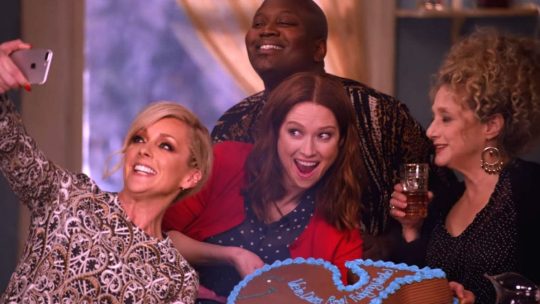
This is a newly introduced series to me by my own Netflix algorithm and let me tell you, IT'S MY NEW FAVORITE ONE. I finished the series quickly because it was "unputdownable." I had to keep watching because the entertainment it provided served me well (it's practically my kind of humor). Despite being a comedy with a light-hearted ending, I kind of cried when it ended because, well, I had to keep going now with my own life. Back to boring paperwork and non-fiction reading. So instead of moping about it (and yes, I know I can just re-watch it again, but you and I know it'll feel different), I thought, why not list down SOME lessons I learned from its four main characters. I emphasized the word SOME because, believe me, you will learn so much more. Not just from the plot and these four characters but from the other characters that are unmentioned here. So here we go, what Kimmy, Titus, Jacqueline, and Lillian taught me.
What Kimmy taught me:
Kimmy taught me to not let your past define you, and being a late bloomer has a lot of advantages. Intentions are pure, ego untainted, and your presence becomes infectious. Sure, she may have missed a whole big chunk of her life, but she also realized how much she hasn't. The world will continue to evolve with or without us in it, so what's there to miss? We'll bloom just as much.
You will never do the world harm by choosing to be kind. It was always about helping people when it comes to Kimmy, which became one of her callings and ultimate purpose in life as the series escalated. While the people around her taught her that the world can be cruel sometimes, and we become accustomed to it, she chose to kill the cruelty with her unconditional kindness.
You can be tough without compromising your sweet and loving self. Kimmy had to learn the ins and outs of life's cycle. She may have suppressed her feelings and emotions at some point, but she knew that we're all entitled to all feelings. Which made her character very likable. Eventually, she learned anger, frustration, rage, and sadness. It wasn't always love and happiness, but she knew it was just part of our functioning.
Face your demons, but move forward while doing it. Trauma is not to be ignored by a person's past experiences. Even though Kimmy had trouble facing her past, she still did. But instead of staying in the past, she met it by saying, "yep, that's all that is. The past". It's not likely for someone like Kimmy to be at peace with her terrifying bunker past. Still, she is as the title says, unbreakable.
What Titus taught me:
He gave me a new light on how to view gay characters in a series. He is NOT your gay best friend, but an entire character and heroine that completes this show. An openly gay role in American entertainment is like a Hollywood Archetype for "sidekick/best friend to make serious and dark topics seem lighter and funny." Uhm, no. Titus is different. He is known for how unapologetic and opinionated he is. Making him a strong character that you should not be messing with.
He taught me to be expressive and passionate. It's not easy to in New York, a place to live your dreams and other people who chose it to live their dreams. Titus taught me to never compromise doing what you love for the sake of fortune and stability. Rent should've been taking notes.
He taught me to stay true and continue to pursue your ultimate dream. Despite his self-centered and lethargic temperament, he is authentic and resilient. His character improves in the series without compromising his beliefs and goals. Eventually, he got what he's always dreamed of. Along with Mikee, which btw, I STAN their relationship and I’ve been rooting for them since their first conversation.
What Jacqueline taught me:
She taught me to never forget to look back at where I came from. Like Kimmy, Jacqueline tried to forget and abandon her past. Although it wasn't because of trauma and suppressed emotions, Jacqueline became neglectful of her roots. After massive shifts in her life, she eventually decided to go back and embrace her family roots. Which provided not only her peace of mind but also to fulfill a purpose that is anchored towards her family's heritage. Throughout the rest of the series, we also see how she kept in touch with her family and how they have been supportive of her as she rebuilds her life.
She taught me that's it's okay to start again. After several mishaps in her lavish lifestyle, Jacqueline realizes that she has much more worth than a trophy wife. Her character developed as much as well in the series. Dealing with divorce, being broke, and having no experience to start a career. She killed it anyways.
She taught me to learn how to unlearn. Coming from a wealthy and obnoxious lifestyle, Jacqueline had to keep up with her change of status, which made her humble herself and put others first. Whether it was for Kimmy or a random stranger. Even with how she tackled love and dating. In season 3, she fell in love with a man because of his compassion and care for the better (which she broke off eventually when that man became a narcissistic, self-serving being). Towards the end of the series, she questioned a man who was attracted to her. Pointing out that he should like her for who she is and not just for her looks. Kudos to Jacqueline for being able to do an easy job in starting all over again—and—being able to do it in style.
What Lillian taught me:
She taught me how to fight for what I believe in. With her unconventional ways and dispositions, Lillian was the more badass gal in the group with her continuous fight for anti-gentrification and preserving the neighborhood. Including its crime-filled community, kind-of-unhygienic but vintage establishments, and torn down structures and buildings (give it a break, it's an absurd comedy). Even though some of her character's dispositions are impractical, Lillian taught me to always fight for what I believe in. Even if our beliefs sound impractical, we have a voice. What better way to use that than to speak them out and who knows, maybe someone will listen and take action with you.
She taught me to not care about what others think of me. Like Titus, this is what Lillian has been throughout the series. True to herself. Even when she started dating a rich man, and Jacqueline insisted she had a makeover when she was about to meet his family, Lillian didn't comply. She liked who she is doesn't care what people think of her. In this new age of selfies and personal branding, caring what other people think has been mainstream since we got introduced to social media. We can't blame those who do care because the internet says so. So next time I find myself overthinking what others have to say about me, I'll think of Lillian.
Final thoughts:
First, to say that the series is relatable is a downplay. This series attacks topics through its characters about modern and mainstream problems about society. They tackle it absurdly and funnily, but still quite agreeable.
Second, you can learn a lot from these four characters, and it's unlikely that there is a character from these four that you will hate. Because once you watch it, you will admit to yourself that, at some point, you may have been like a Kimmy, Titus, Jacqueline, or Lillian in your life. And I don't just mean on their mistakes and blunders. Just the entirety of how they represent what their character stands for. Especially with how their characters develop as the series profressed. This series stays true because we are only humans who make mistakes just as much as we will make successes from these mistakes. It's the circle of life.
And lastly, it's pure comedic genius work that is woke and hella funny. Kudos to the creators of this show. It sucks that it only lasted 4 seasons. You will love joining these four people in their adventure through life. And I agree 1000% to the series' theme: Females are strong as hell.
P.S. I'm re-watching it again. Feel free to judge. And I love you, Tina Fey
16 notes
·
View notes
Text
This thread will explore the character design and visual cues for easy identification of characters in homestuck. Go in detail about design choices for specific characters and how they work well in differentiating the characters
It has already been explored how her long jacket makes her look smaller, but it’s an interesting addition to her design and balances all the indigo she wears otherwise she would be wearing more indigo than her actual color. When looking at the base sprites for characters in homestuck it’s interesting how they’re both at the same time 1: very simple, following the same base and lacking various characteristics (like noses and ears) and 2: extremely easy to differentiate from each other.
Even arguably the two characters most alike to each other, June and Jake who have the exact same face and only differentiate from each other by their hair and outfit are easy to tell apart even when ignoring their bodies and looking only to their faces.
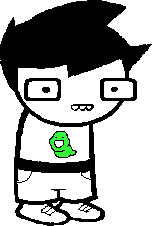
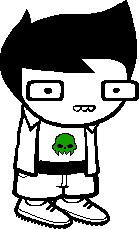
And of course we should mention the use of different glasses for easy identification of the characters. In a comic where characters are so simple it begs the question: how to make characters easily identifiable? The answer? A lot of glasses.
Jake and June again are the only ones who share a pair of glasses, all the others have one completely unique to them. Jade has round ones, Jane has oval ones, and we absolutely can’t ignore the iconic Strider shades.
Dave and Dirk’s shades have not only become something to easily identify the character, but almost a platonical symbolic representation of their characters. Dirk’s glasses specifically considering how unique they are and how they associate him with anime protagonists
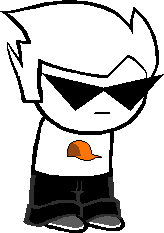
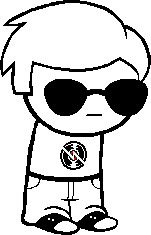
This makes the few characters like Rose and Roxy that don’t use glasses almost unique in their own ways. When six out eight kids wear glasses being the only ones who don’t becomes a novelty (not even mentioning Meat Roxy’s heart shades).
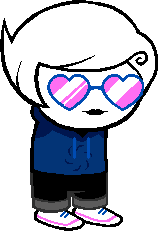
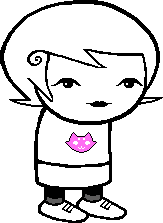
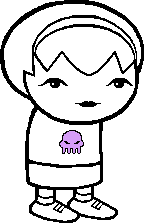
Other subtle details in each character like how their hair is build, mostly using basic shapes that don’t even look like hair and more like a symbolic representation of hair. Like Dirk and Dave's hair are literally birds turned 90 degrees.
Other details like Rose’s headband, the Prospit kid’s buck teeth in contrast with the Lalonde’s lipstick and between their eyes with Jade and Jane’s while June and Jake only have dots for eyes.
Their symbols on their chests and the main detail of their outfit is also a huge signifier of who you’re looking to and part of their personality. Also the only hint of color in their initial outfit designs.
Their bottoms are all also simple and minimalist representation of their clothes. Jade has a long skirt that slightly sits on top of her shoes: You can either read that as just a normal part of her long skirt, or that she’s too small for her skirt.
And now we get into how their designs are so abstract that you can easily have different interpretations of visual things. Some things are just shapes and colors in a way different people will interpret it in different ways.
Maybe Roxy’s hair just looks like that or maybe it’s meant to represent the beehive haircut that was popular in the 60’s linking to Mom Lalonde’s vintage housewife aesthetics.

So let’s skip to act 5 and take a look at the trolls: The first one to have their appearance shown is Karkat. You can consider him the default troll that all others are defined by how they’re different from him.
He has no glasses, little bags under his eyes and what I like to think is the equivalent of buck teeth connecting him with June. They also help his face look less blank. Adding fangs and teeth to trolls is another easy way to make their designs unique.
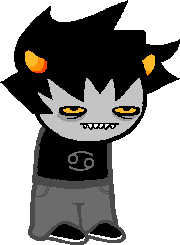
His hair is very wild which fits into being an literal alien and presents how other trolls will also be wild and have more different designs. His shirt is black, a clear juxtaposing to the kid’s white outfits as the trolls have mostly black clothes.
Creating a clear distinction between kids and trolls and a shared motif between each group. Karkat also has a symbol on his shirt, but a astrological sign one in contrast with the kids having mostly symbols that don’t properly make a pattern.
And of course: he has horns. Giving each character unique horn designs fitting their zodiac motif and personality is another great way of differentiating between them. Each one has a distinct pair of horns that can be easily used to differentiate them.
The next to be introduced is Gamzee: His expression reflects his personality. His hair is even more wild and barely even looks like hair. It's just a lot of shapes together conveying the idea of very wild and unkempt hair.
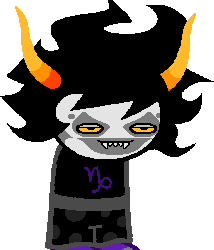
His horns are much longer and his teeth looks like proper fangs and his facial paint and pants details reinforce his clown aesthetic. He also wears his blood color on his shoes presenting the pattern.
Why is Gamzee often considered the tallest troll? All characters in homestuck have no clear size distinctions. In this image we see Nepeta and Equius (who fanon wise often have very different body types) having the exact same height and body type.
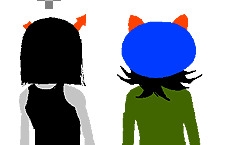
And while Karkat is shouty, he is also harmless, making it common the body type of a very angry little marshmallow. Kanaya on the other hand is composed and refined, making it easy to view her as tall, but in a very different way that Gamzee is tall.
Terezi, has a much more kempt hair and a simple design. Her horns are small, just a little more sharp than Karkat’s, but she is also the first one to have glasses, bright red ones like her shoes which connects her design to Vriska.
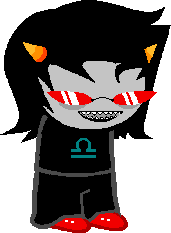
Her glasses are another point of iconicity. Where you could only draw a piece that is enterily composed of her glasses and the viewer will know that it’s about Terezi Pyrope.
Her smile and her sharp teeth is another point that brings her personality out. She is sharp and although she is smiling it’s not a friendly and welcoming smile. It’s a smile that invokes fear as she is not scared of violence.
Sollux is another one that comes with iconic glasses. They’re not only useful as a visual signifier, but it fits his duality theme and the two universes. They’re perfectly round in contrast of Terezi’s sharp glasses following shape theory
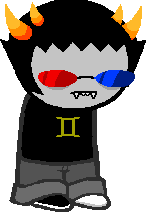
Rounder shapes are whole and friendly in contrast with triangles that are more dynamic, volatile and aggresive. Sollux might not show it, but he is also harmless and one of the trolls with the largest common sense among the twelve and highly caring for the others.
He also has 4 horns. They’re all very simple, but the fact he has the double amount than all the others not only also fits his themes, but also helps to easily differentiate him from the others. His hair is short, simple and somewhat kempt.
Unsure over the intent of his “bangs”. Are they just short? His hairline? There is a joke about him cutting his hair with funny scissors. Interpretation. And for last his shoes also fit his theme of duality. A small detail, but helps to build his character with few cues.
Tavros has a mohawk (or side cuts, interpretation) and very large bull horns. He wears sandals on the color of his blood and a jacket in contrast to all the others that wears only shirts (something he shares with Vriska)
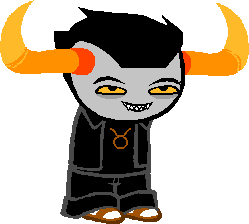
We will be mostly focusing on Aradia’s dead form because she just changes forms too much in a period of time too small. First: her eyes are completely blank a very clear visual signifier if you ask me!
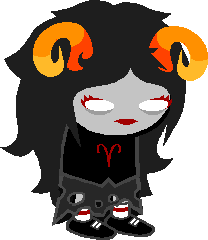
Her ram horns reinforces her motif and red lipstick and lashes makes her face that would be otherwise quite bland more unique. Her skirt reflects how she is dead and i like the implication that her shirt is button up one.
Another on the list of “things that are implied, but not actually confirmed so its open to you on how you want to draw them”. Her hair is long and fluffy, like a sheep’s fur! Another fitting into her motif.
Next we have Nepeta. She is the first one to have clothes of the blood color of someone important to her. Directly connecting her design to her moirallegiance to Equius. Her mouth and horns fit into her cat motif and her wild hair reflects how unkept she is.
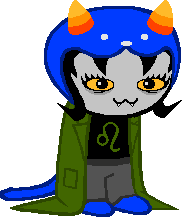
It has already been explored how her long jacket makes her look smaller, but it’s an interesting addition to her design and balances all the indigo she wears otherwise she would be wearing more indigo than her actual color.
And how long can we talk about homestuck without her eventual appearance? That’s right, the next one to introduced is Vriska Serket. Part of the iconic glasses gang her half shades aviator and eightfold eyes makes not only for an easy signifier that “yes, this is Vriska”
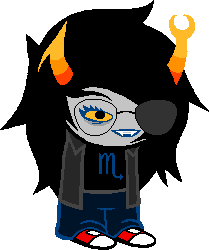
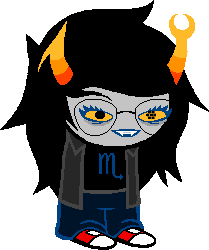
But fun fact! the reason i started reading homestuck in the first place was because i saw an image of vriska and i wanted to know what was the deal with her eye.
Her horns reflect the hook and and arrow in her symbol, but also there’s meta about how it represents the sun and the moon. Much to think about. It also connects her with Kanaya as they share one horn since both of their signs are “M”s.
Her jacket is something she shares with tavros and her red shoes she shares with Terezi. Her large hair has a small bit that reminds me Jade which I like to think links to how they’re almost opposites, but I might be just making this up (interpretations!)
Also her eye patch and metal arm links her to captain hook, but I already wrote a very long meta on that too. https://tinyurl.com/qooc5el
Next is Equius. His horn is broken which explores how trolls *can* break their horns over physical trauma. It fits into his symbol and also phallic metaphors. He also wears iconic glasses: square shattered ones with eye bags underneath.
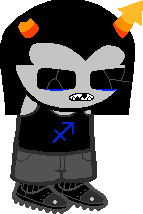
His default mouth brings in to the fact he constantly breaks his teeth and he is one of the only characters with straight hair. And for last: while Nepeta wore indigo all over her her body, Equius doesn’t wear a single piece of green clothing.
Kanaya somewhat follows Terezi and Vriska’s of bright red pieces. Her hair is short and very sharp with few details. Her visible fangs make her mouth more unique. Her long skirt connects her with Jade as they’re both space players.
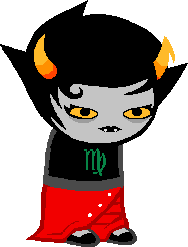
Her design is clean and conveys very well the idea of how refined and consistent she is. She cares about her appearance and also her T-shirt long sleeve shirt combo also helps to make her more unique
Eridan and Feferi are awfully more detailed than the others like the more far from Karkat we get the unique designs do (which also reflects on how detailed the dancestors are). But anyway.
Eridan is the only one to have dyed hair. His face doesn’t need that many details as he also has those big square glasses and seadweller fins. He wears a lot of Vriska’s color showing how he didn’t moved on from their break up and golden rings to show royalty.
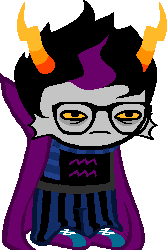
Feferi is almost the only one with no bangs which already makes her design unique. Her golden tiara and goggle make her face unique and simple to signify. her outfit is awfully detailed compared to others with golden jewelry and whatever that skirt was.
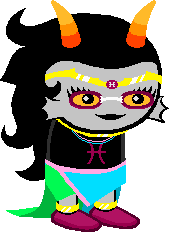
All the unique glasses help to frame all the character’s faces and make clear who they are even with the lack of noses, ears or different facial shapes. All the different types of tooth and color of lipstick help to easily differentiate their mouths
It ends up creating designs that could be hyper simplified and still be recognizable. Reducing a character to it’s bare essentials, but it’s already presented on it’s bare essentials so you only elaborate on that.
Not only that but they're reduced to platonical symbols that can easily be subverted so a character can be so many different things.
And here’s hyper fast doodles of each character I did to prove how simple it is to convey an image that can easily be related to each character.
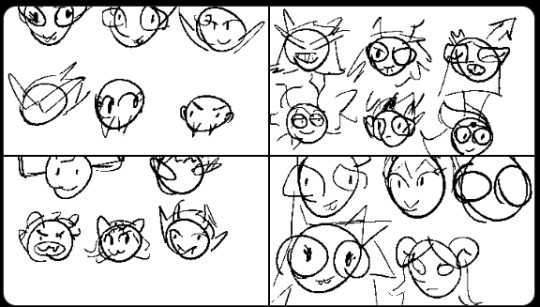
A few more bits on other characters: The midnight crew all have unique body shapes as they lack hair and have very simple designs. They also have unique hats for each one.
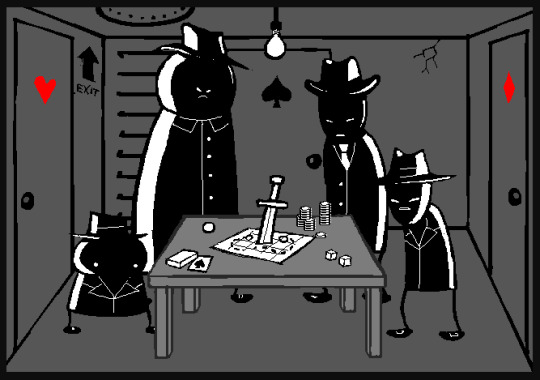
Doc Scratch’s head is a white circle. You really can’t go more unique than that. You see a large white circle, that’s doc scratch. It's hyper simple, but also not meant to be interpreted. It *is* a circle and that's it.
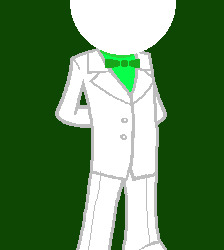
The Felt has very unique body shapes since there is way too many of them and they need to be clearly different from each other. They also have unique mouths and and hats, not only in color, but also in shape, to elaborate on that.
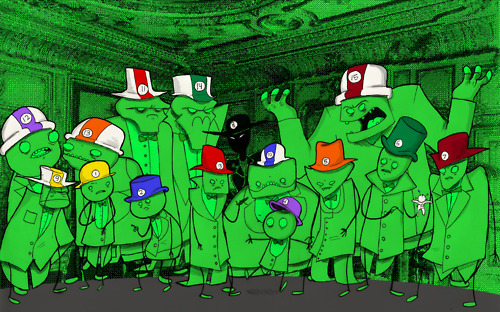
The cherubs, well they’re green so it’s easy to distinguish them from other characters and it's interesting how they're so similar to each other, but also so easily differentiated: eyes, cheeks, mouth expression and outfit is all you need to see the clear distinction.
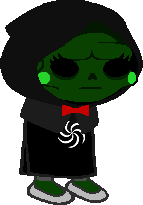
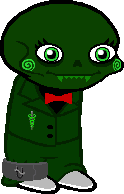
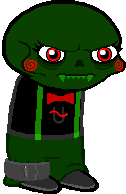
thank you for reading
#long post#homestuck#character design#june egbert#rose lalonde#dave strider#jade harley#jane crocker#dirk strider#jake english#roxy lalonde#Aradia Megido#tavros nitram#sollux captor#karkat vantas#nepeta leijon#kanaya maryam#terezi pyrope#vriska serket#equius zahhak#gamzee makara#eridan ampora#feferi peixes#doc scratch#midnight crew#calliope#caliborn#homestuck meta
7 notes
·
View notes
Text
Why I'm worried about the ATLA live-action series: A look at the importance of suspension of disbelief
*disclaimer: I am not a movie critic, have never studied animation or film-making, and have limited experience in acting. I am speaking from the perspective of a consumer*
I'm sure many of you have heard, they're making a live-action ATLA, and although I'm happy they have a lot of the original creative direction and will cast an entirely Asian cast, I'm still really worried about the medium.
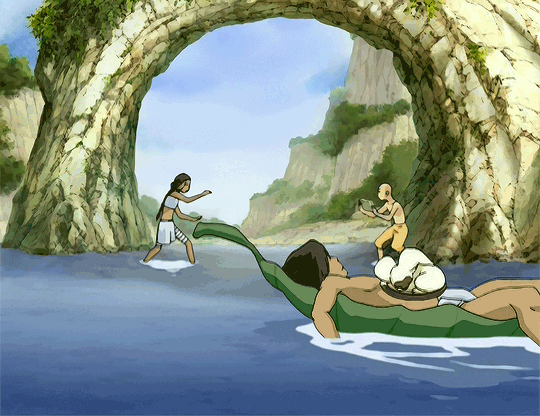
Firstly, what made Avatar so great was its INCREDIBLE ability to balance heavy topics with pure whimsy! In between learning more about the trauma of the past and how it affects the future, we have fun moments like Sokka tripping balls on cactus juice or Iroh being a whole mood or Toph's amazing ability to laugh at everything somehow.
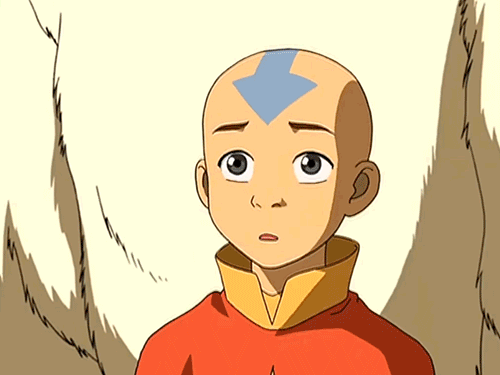
Animation, whether it is 2d or 3d, has the ability to bring in exaggerated and hilarious facial expressions, impossible contortions, gags, and strange movements, creating a type of humour hard to replicate in any other way. It provides a suspension of disbelief.
Suspension of disbelief is defined by Wikipedia as, "an intentional avoidance of critical thinking or logic in examining something surreal, such as a work of speculative fiction, in order to believe it for the sake of enjoyment". In ATLA, the audience can ignore the fact that physics in this world are unrealistic because it's a cartoon! All the jokes and animals add to the colour fantasy world, and it is all accented by the bending!! As a medium, animation can achieve with ease what actors rarely can: pure, unaltered whimsy. And for ATLA that is essential.
I'm not saying conveying that whimsy in live-action is impossible, but when the Baloo from the Jungle Book remake talks while looking ENTIRELY like a bear that could very much kill you, you get a MUCH different vibe than when Yogi Bear exists as an exaggeratedly unrealistic talking bear in his movie.
Let's take a deeper look at the Jungle Book.
The original movie, although full of the influence of its problematic origins and creative direction, was fun, with upbeat songs and interesting animal characters in an easily digestible format. On screen was only what was important for the viewer to understand the story, nothing overwhelming or distracting. The medium provided that suspension of disbelief. Animals can talk? Sure, go ahead! Hypnotic snake?? Add that right in. A human boy could survive for so long in the jungle?? Of course!! It's a fantasy.
But the live-action version, was borderline terrifying at moments. It's a gorgeous movie!! But I really don't think it was anywhere NEAR as fun to watch. Any talking of animals seemed jarring against their realistic depiction. The scene where Mowgli leaves the pack is so much more heartbreaking and sets a much sadder tone due to the realism and darkened lighting. King Louie's makeover as a grotesque gargantuan monstrosity haunts me to this day. It doesn't feel like a children's movie anymore, it feels like a weird attempt to get audiences to praise D*sney for having amazingly talented staff.
The whole movie was an impressive feat, but by spending so much time and money on realism they lost the heart if the story as it originally was, and created something completely distinct. Which isn't bad, per say, but in the pressure of realism it lost all the fun that made the original good.
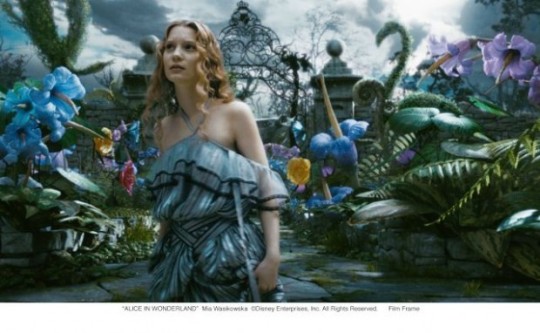
A good counter-example is the Alice in Wonderland series of remakes, which i believe was the first live-action remake D*sney did(correct me if I'm wrong). They perfectly captured the off-kilter, whimsical air of the whole tale. But with Alice, suspension of disbelief was written into the story. She spends her whole time in Wonderland! A topsy-turvy off-putting new reality that tossed all known laws out the window. Realism had no place there to begin with, so creating a surrealist fever dream did the trick in suspending the audience's disbelief even through the live-action medium.
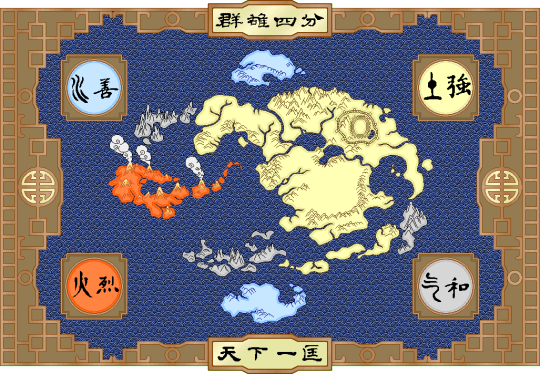
Avatar the Last Airbender is right in the middle of these two. It has the suspension of disbelief in both its fantastical elements and its animated medium. But it also is heavily influenced by meticulous study of real cultures and their myths.
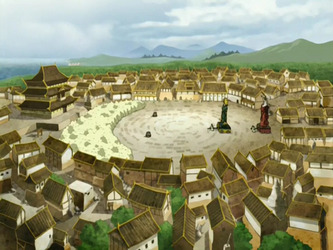
I fear that the necessity to depict these worlds in a complete and accurate way will detract from the fairy-tale like aspects of the whole story if not done with IMMENSE consideration and care. They need to depict the amazing creatures in the story, have age-appropriate casting, write the characters with all the nuance of being REALLY young kids with the fate of their WHOLE WORLD in their hands. And on top of all of that, the suspenison of disbelief needs to be there!!! If they can follow in the Pokémon live action movie's footsteps and depict loveable creatures of the fantasy world, that could help balance it out, but the epic potential of the bending scenes in a live action format will likely push them to age up the characters and essentially turn it into almost another action movie, losing the beauty and nuance of the original.
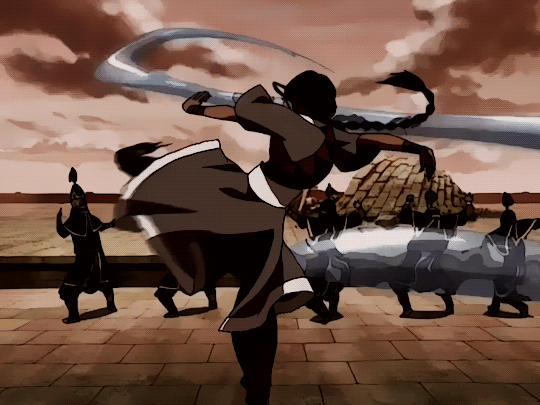
That's not to say live-action has no place in the ATLA world! For example, the story of Avatar Kyoshi (video description here) is so heavy and dark that I don't think an animated cartoon would do her justice, because there is no place for the whimsy of ATLA in her story. She is arguably the most "yes murder" of all the known avatars, and her story is so action-movie-like that it would be a perfect candidate for a live-action medium (not to mention canon LGBTQ+ rep!!!)
I hope they can pull it off, but I really dont wanna put my faith that a live action medium won't turn ATLA too serious. They need to find a way to add whimsy and fantasy into the world to the same degree they add the realism necessary to pay respect to the influencing cultures, and though it isn't impossible, it will be difficult.
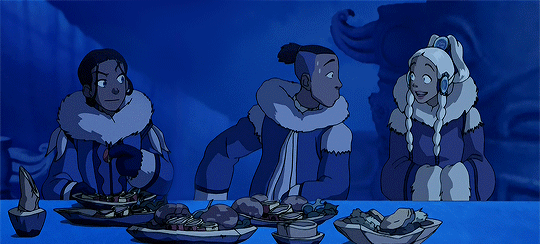
#atla#atla remake#avatar the last airbender#essay#analysis#atla analysis#writings#movie analysis#suspension of disbelief#in this essay i will
3 notes
·
View notes
Note
Any song associations for Scott Fuller?
I read this ask as I went to bed yesterday and my brain went “ooo, meta on Scott?” Took a long ass time to convince myself that no, this is not asking for a detailed analysis of Scott throughout the seasons, but I only managed to wrangle this into more of a half-meta half-song association.
There is no one song that can encompass Scott Fuller over the entire series, because he arguably goes through the biggest character development on the show. And I don’t know if it makes the writers geniuses or lazy, because nearly all of his development happens off screen. Most of Scott’s focus on screen is about who he is to other characters, primarily Kate, and not who he is as his own person. If the whole of From Dusk till Dawn was told again only with Scott as the main focus, we’d get a whole new show, with just a few scenes that would be repeats of what has already been shown. The same cannot be said about any of the other main six (Freddie you almost could, but enough of his story overlaps with the main story being told that there’d be parts where people would go “we’ve heard this all already.”) And since Scott goes through such massive changes through out the show, I associate different songs to him at different times.
At the beginning of season one Scott: I’m Just a Kid by Simple Plan.
They’re such a quintessential 90′s band that there’s no way I actually feel he’d listen to them (wrong time period), and that’s assuming the Fullers even listen to secular music which I doubt given the bits of evidence on their music tastes we get. I don’t think Simple Plan necessarily encompass who Scott is at the time, but they are a band I feel like he would think represent him and that particular song reminds me strongly of him throughout most of season one... or rather it reminds me of how I think he views himself, which is not necessarily how I view him.
By the end of season one: Same band, because it’s such an “I’m an angsty teenager, no one understands me” band and Scott is very much an “I’m an angsty teen, no one understands me” kind of teen in the first season, but more the song Perfect.
I think Scott would feel it represents him at the end of season one, when he’s been rejected by his sister and his dad tried to mercy kill him. Scott’s all emotions and impulses by that point, in no small part because he’s a fifteen year old kid who’s going through a massive life changing trauma on top of the culebra transformation, which has been shown to cause some mood swings/poor decision making, and there’s no small amount of hurt and resentment bubbling up inside him that I think he’d relate to the lyrics about a son calling out his father for rejecting him in a way he didn’t before. Scott desperately loves his dad, so much so that he tried to turn him against his will so that he wouldn’t lose him. And Jacob, for all his good intentions, saw Scott’s culebra-ness as “something evil and vicious” that needed to be eliminated. He may have changed his mind, but by then Scott had stormed off believing that his dad (and sister) saw him as a monster they wanted nothing to do with.
At the beginning of season two (because the Scott from the beginning of season two is very different from the Scott by the end of season one): Middle Finger by Bohnes.
I swear season two could be considered the Season of Anger Issues, and not just for Scott. There’s been a lot of anger built up during those three months between seasons, most of it justified and/or stemming from hurt and none of it even beginning to be worked through. Not only is Scott a literal slave to the people everyone else managed to escape from at the end of season one, but due to the rejection he felt from his family and being turned into a culebra, Malvado’s people are the only ones he feels will accept him. He feels he belongs with them, and that he has to prove himself worthy of not being mistreated by them. After three months of being chained like a dog at the feet of Narciso, he finally gets a little bit of not-as-bad treatment and some freedom from Carlos. He’s hurt and angry and doesn’t know where to direct the bulk of his rage and ends up turning towards revenge, and the song just fits his mind set so well. There’s a whole big ol’ mess of stuff to dive into about him and Kate, in no small part because Kate handled her reunion with Scott all wrong and Scott himself was in such a stubborn child-like mindset of wanting to reject the person who rejected him so they could feel the pain he was feeling... and this ask is about songs, so I’m going to leave that for a different time.
But all the Kate&Scott stuff leads to the end of season two: O Valencia! by The Decemberists
Not the entire song, since it’s more about Romeo and Juliet-esque forbidden lovers than siblings, but the overall feel of it. Especially the chorus and the last half of the last verse and that change in the line to “you’re blood gettin’ cold on the ground” just feels to me like Scott in those last few episodes of season two. He comes to so much clarity after Kate dies, is forced to face just how much he was ignoring up to that point. He was trying for so long to punish her for rejecting him and to convince her to leave him (and no one can convince me that part of him trying to get to leave was because as mad at her as he was, he didn’t want her actually harmed) and then... just like that she’s gone, and all the possibilities were taken from him and suddenly his anger goes cold. It stops being this hot, burning thing in his chest that consumed everything, and becomes something sharp and hard and completely focused. Which is probably plays a part as to why this particular revenge song reminds me the most of Scott at the end of season two, because it’s not this screaming rage of a song, but rather its more akin to a love song. The promise of revenge not rooted in anger, even if there is anger there, but in the love and commitment to a person taken too soon. Scott’s not setting out to kill Carlos because he’s so angry he can’t see beyond it, but because he loved his sister and now this is what he has to do.
Season three Scott: Mostly I associate him at this point with Fanglorious. There’s not actually a song that reminds me purely of season three Scott, but for the purpose of this I’m going to say it’s a tie between Reckless Youth by Pillar and 100 Years by Five for Fighting.
Reckless Youth is more a song that reminds me of Scott making the conscious decision not to slip back into old habits/resentments. He’s not drowning in his pain anymore, not being poisoned by his anger, not even wallowing in his guilt over Kate (and the others that died because of him) which is still very much there but it isn’t controlling him. And he could so easily do just that, he’s lost everyone at this point, has so many reasons to let everything overwhelm him and yet... he doesn’t. He’s made something of his life, found his path and followed his passion and carved out a little place for him in the world. And Pillar is a Christian rock band, which is a bonus tie to Scott for me.
100 Years is kind of an ironic song to remind me of Scott. It’s literally about how fleeting life is and how little time we have on this earth, (with the actual repeated line of “I’m fifteen for a moment”) and Scott’s an immortal (who is stuck forever at fifteen.) But it’s also about how precious those moments are, about acknowledging regrets but not letting them define you, and its about looking back on your past and accepting what’s happened while still turning towards the future, and all of that reminds me of where Scott is in season three. The entire feel of the song is very S3!Scott.
Scott grew up so much by the time we see him again in season three. Which I have mixed feelings about. On the one hand, I love the adult he’s becoming, and I’m so happy he found a way to not let his issues control him. But on the other hand.. he’s fifteen! He should be allowed to make stupid decisions and let his emotions get the best of him and get angry and throw tantrums and just be an angsty teenager... but then on a third hand, he’s living in a world where doing that will literally get people killed. It already has, and I’m not just talking about Kate. He doesn’t get to be a kid and a culebra. He doesn’t get to be a typical teen when the events of his life has buried him neck deep in blood and death and throwing a fit will result in a higher body count. And it sucks and it’s not fair, but life threw Scott the short end of the stick and he managed to make the best of a truly shitty situation... once he got his head out of his ass that is.
Special shout out to Teenagers by My Chemical Romance, because I saw it in a crack video and now I can’t hear the song without thinking of Scott. The chorus also fit Scott circa season two while the verses remind me a bit of him in season one, but was put to clips of Scott killing baddies in the prison while Richie looks on in surprise. It’s probably the only song that I can associate to all three seasons of Scott, if for three different reasons.
#scott fuller#fdtd#asked and answered#meta#despite my best efforts#from dusk til dawn: the series#From Dusk Till Dawn#scott deserves more love
3 notes
·
View notes
Text
Lapis, Present, & Future
an empathetic hot take on why, while i love lapis, i don’t think her future character development should be a straightforward redemption arc.
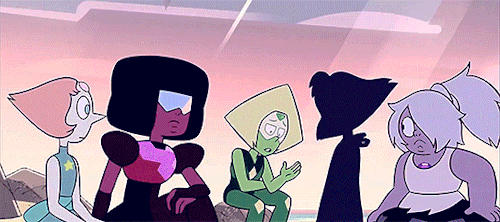
lapis has always been one of my favorite characters. she is flawed, haughty, volatile, and can hurt others deeply, but those are things i like about her. i wouldn’t want her to become a truly heroic figure, or keep up the pretense of a perfect victim. i can’t relate to those things, and that’s not her.
her antagonistic moments are when she truly seems to be acting as she wants, no holds barred, which tells an interesting story. i love those parts of her.

meeting her like this was the coolest shit ever. you can feel her anger, boiling over as the sea rises... and yet, she’s directing it at all the wrong people. steven just freed her, and the crystal gems didn’t know she was alive. she just assumed they did. lapis has an awful habit of casting herself as judge, jury, & executioner, going with her initial worst impulse when she feels threatened.
and she still makes sense as a sympathetic character. she’s thrust into this brand new world, she can’t go back to the home she had before the war. she can’t even understand what homeworld is anymore. her worst actions are pretty extreme, yes... but she is in extraordinary circumstances. even if that’s not the fault of those she hurts for it.
the point is, you get her. even if she might be bad.
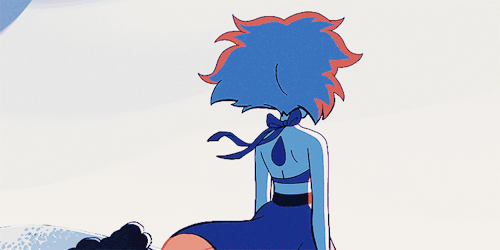
keyword might, she’s far from all bad. she’s traumatized, she deserves help for that, she’s grown to care for steven, and she harbors guilt for what she’s done. that guilt isn’t always altruistic - usually, the focus is “what consequences will i face for this” - but you get why. it is real. she knows she’s done genuinely bad things.
much like why she inflicts pain on others, her being flighty, emotionally volatile, and impulsive are all trauma responses. born out of her personality, as an ex-elite gem who - according to rebecca sugar - does know she deserves better, and the situation at hand.
however. the reason i can talk about this so succinctly and sympathetically is that the show has focused on her trauma quite a bit. it’s easy to feel bad for lapis. the show clearly wants you to. but... well, she has done terrible things to others. and steven, whose perspective we follow, is so used to seeing lapis as a victim that he can never bring himself to be mad at her.

neither can anyone else - peridot is so obsessed with pleasing her, she doesn’t realize when it’s gone way too far. she’s completely neglecting herself to make sure lapis is never, ever upset or challenged as a person. that’s just not healthy. and... i think that should have a genuine consequence for lapis’ arc.
because really, what it does is it prevents her from truly growing. and if that’s the point of it, then the crewniverse is writing a WAY more interesting story than a straightforward redemption arc - they’re writing what happens when everyone assumes she doesn’t need one, and just focus on her trauma, not her actions. that criticism would just upset her.
and that’s a story i wanna hear.
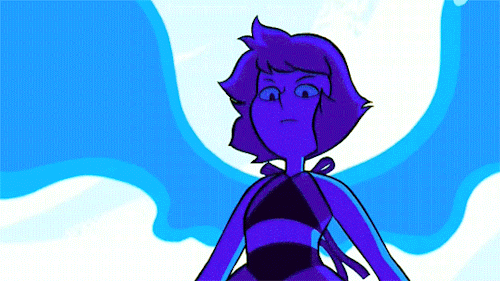
plenty has already been said about lapis in "reunited”, but one thing i don’t think is true is that this was the result of “off-screen development”. not really.
if lapis lazuli has a defining characteristic, it is the very idea emotional volatility. lashing out + making emotional snap decisions is kinda Her Thing.
i think this was that. we saw this in “same old world”, too. lapis is not on earth because she wants to, but because - in her words - how she feels about homeworld punishing her. that punishment feels inevitable after what she’s done, and that prompts her to act. “if they’re gonna punish me like a crystal gem, i might as well be one”. in other words, she feels she doesn’t have anything to lose anymore.
however... she isn’t in love with earth, or the CGs. she’s never shared a bonding scene with garnet, amethyst, or pearl. she’s always kinda forcing herself to get used to it. i think the show is aware of that, judging by “gem harvest”.
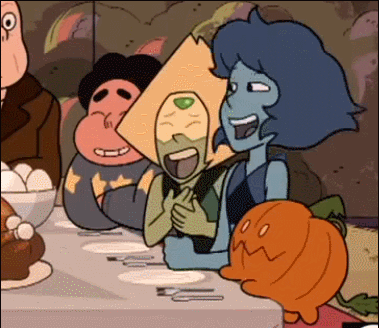
why don't you put that corn in a mirror for thousands of years, and then see how it feels about the table?! IT WOULD REALLY HATE THE TABLE!
this reminds the audience that the current status quo isn’t perfect. you’re meant to be uncomfortable with lapis’ place in all of this. heck, even if you stan her, she’s not happy. this is why her leaving was so effective. calling herself a CG may intentionally feel wrong, like she’s settling for a cause she’s not dedicated to, because she’s not dedicated to anything.
so where can this be headed? it’s framed like lapis facing the music, doing the right thing to earn forgiveness, but not, crucially, the end of her emotional volatility. it’s a part of it. if threatened, she’s prone to lash out again.
yes, things feel happy and settled now... but it might not last. which wouldn’t be fair, either. no one gets that easy an arc, as lapis pointed out when navy-ruby was pretending to be perfectly redeemed through friendship alone. “no one could be that well-adjusted”. lapis, too, is more interesting when her friends are faced with her faults - and sometimes, even lose her.

perhaps just as importantly - her “big damn hero moment” doesn’t address the pain she’s inflicted on the other characters. i want to believe that’s intentional.
if i’m right, as i was about her leaving, they’re not writing a redemption arc without accountability. they’re slowly letting the characters figure out that she’s not as perfect as they think, and only then will those she’s hurt find closure.
for one thing, nobody in the main cast knows her past. five seasons in, we got no idea! she was an elite in blue’s court, and the only gems who know that role are bismuth and blue diamond, who both tried to kill her... and we still don’t know why bismuth did so. just that lapis was “supposed to be there for a short time” (doing what exactly?), and that a lapis terraforms.
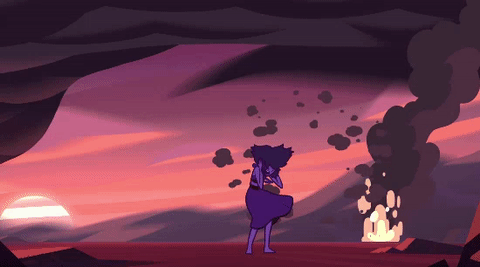
i think that’s meant to give us pause. her backstory was told so simply, so lacking in nuance, it reminds me of rose’s backstory in “your mother and mine”: what happened was real, yes, but different in context. it’s never that simple. i don’t think it’s an accident that bismuth is back now... and corruption is the focus of next episode’s promo, meaning jasper could return... meaning raid theory may get its day in court sooner than expected, and lapis with it.
in any case, lapis returning to “face the music” only works if there’s still music to face - and there should be. she’s hurt greg, peridot, jasper, almost drowned steven and connie... the show deliberately called the latter out, and dismissed connie in a way i think was, once again, intentionally avoiding lapis’ faults. connie went along with it, but not happily.
we shouldn’t make the mistake of thinking this is the “final lapis”. SU hot takes tend to assume the current situation is forever (see: bismuth), or the morally correct one (see: bismuth), and i don’t think that’s true. lapis has already pretended she’s “in retirement” at the barn, as rebecca put it. the stability of that appeals to her sense of self-preservation.
but in doing this, lapis kinda gets in her own way. earth is not her home, and her friends don’t know her. they excuse / ignore her flaws - like peridot did with the unhealthy parts of their relationship. how much lapis has been through became the default mindset she adapted, de-prioritizing how she felt. steven did the same. he knows reminders of the past upset lapis, and even dismissed his own dad’s trauma in “the message” once greg called lapis mean.

greg: well she’s a riptide queen and she’s super mean! steven: whoa, hold the phone, lapis was not mean! she was just trying to get back home!
those things don’t need to contradict each other, though. yes, she was trying to get back home, for good reason... but she still broke greg’s leg and almost drowned steven. which makes it a problem that he doesn’t just love lapis, but is dedicated to making sure others do, too.
this is reminiscent of a moment in “beta”: amethyst, while distressed, mentioned jasper. peridot took the liberty of being offended on lapis’ behalf. lapis herself did not have a bad reaction - steven and peridot were just deeply overprotective, to the point of ignoring what other people (in this case, amethyst, and indirectly jasper herself) were going through.
lapis is aware of this (can’t go back, alone at sea), but it’s in her favor to ignore it... the problem is, her perspective going unchallenged is kinda why she left. no one understood her enough to find a fault with the status quo. it was convenient. we don’t have to challenge her, cause she’s not killing us (anymore), so let’s just not. let’s just let bygones be bygones, even tho anyone else would face a mountain of criticism for doing the same.
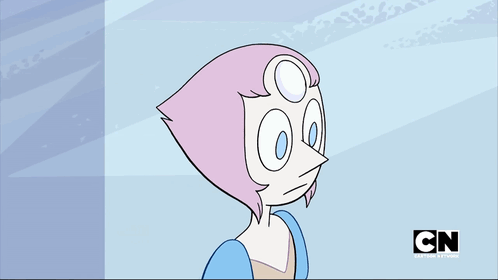
it’s the same loneliness we saw in rose/pink - who was treated as infallible. no one knew all of her, they just saw the leader she let them see. in this context, lapis being treated as this badass hero and tortured victim without a hint of skepticism in “reunited” would almost feel insulting, if it wasn’t for one thing: this is still steven universe, and it’s never that simple.
lapis can’t just be “the traumatized one”. not with all the pain she’s inflicted on others. love can’t save the day, because that love is incomplete. it’s idolizing, without changing or even acknowledging flaws. the dedication to the image of lapis means it’s going to take an outside force - such as bismuth, or even jasper, who has plenty of legitimate beef and IS coming back someday - to put her into context.
everyone’s trauma should matter, including what she’s inflicted. thankfully, SU episodes contrast - they showcase different sides of each character, and that’s what keeps me going now. just as there’s an episode to show rose’s love for earth and pearl, there’s an “earthlings” and “bismuth” to show how she hurt others. we may just... have to wait for ours.
"reunited” showed us lapis at her strongest. now she’s back, the show’s got chance to explore her weaknesses, and put others’ feelings first.

not even steven or peridot can say they trust lapis to always be there for them. they just hope so. SU adores setting up tropes to subvert them, so i hope to see them challenging the “hero comes back last minute, so everything’s fine” thing. hopefully, the moments of self-awareness they’ve set up will serve a purpose: to address lapis’ discomfort with herself, and how she’s hurt others, in ways that can’t just be undone.
#steven universe#su spoilers#lapis lazuli#peridot#bismuth#steven#jasper#the crystal gems#su theory#gifs /#long post /
2K notes
·
View notes
Text
My letter for the @justice-for-allura project. Posting mostly to remind anybody who might be lurking that this is a thing, and it’s a cool thing. If you feel bad bout how Allura’s story went down and wanna make your points known, this is a great opportunity for it.
Edit: Changed some things, fixed a couple typos and reworded some points for clarification.
To the Voltron Team, DreamWorks, to Any and All Involved with the Decision to Kill Off Allura,
Let me begin by thanking the team for giving us this iteration of Allura to begin with. She is a beloved character to many fans. If she wasn’t such a great character, there wouldn’t be so many of us upset about the way her story ended. So, thank you for Allura. She was an amazing character with interesting layers of personality and a delightful design.
In this letter I will explain not only why I was personally disheartened by her death, but also why I believe it was a poor choice to make in terms of writing and the larger narrative.
On the personal end, I related very much to Allura. I empathize with the trauma of losing loved ones and it was cathartic for me to see a character lose so much, but not be defined by that loss. A character who retained a multifaceted personality that included a playful streak, a love of sparkly things, a sense of justice, and abundant courage. She is not reduced to her loss even though it impacts her journey as a character.
Allura’s struggle with Alfor’s corrupted AI also deeply resonated with me. While this is coming from a rather abstract point, it reminds me of my own struggle with a father who is an addict. Allura had to let Alfor’s AI go in spite of how painful it was, in spite of the better memories haunting her every step of the way. The possibility I will have to let my own father go is a very real one because he has made it clear he will never change. His addiction has effectively corrupted our relationship and fed into my own stints with substance abuse. This will be an unspeakably painful decision for me and we have many happier memories that reel through my mind every moment I even contemplate making it.
To relate to a character, to be inspired by a character and her persistence, and then watch her die…really blows. My stomach sank. I felt like crap. I felt even crappier upon hearing that my friend’s nine year old niece sobbed when she watched the ending. I doubt we related to Allura for the same reasons, but I do know that Allura was her favorite character. So with that, I’ll get into the less personal and more objective reasons as to why I feel Allura’s death was a horrible decision.
Firstly, VLD is geared toward younger audiences. I know VLD has a notable periphery demographic, with many older teens and adults such as myself watching and being in the fandom. I know sometimes this periphery demographic can be louder than the intended audience, which I can only assume is children due to the toys and easy-read supplemental materials. VLD has a Y-7 rating, so even if the volume of the periphery demographic drowns out that of the intended, the rating alone demonstrates that this is a show that’s at the least meant to be accessible to children.
Children are impressionable. Representation is important for people of all ages, of course, but it is especially important to children. Kids connect more easily to media where they can see themselves and for the good or the ill, fictional characters can be role models for children.
Allura was a non-white female leader, described in-universe as the “Heart of Voltron.” That’s amazing! That’s truly rare. It’s sad that it’s rare. It’s 2019 and there should be a plethora of non-white female protagonists for young girls of color to look up to. But there aren’t.
Allura was fantastic representation for young girls of color. Representation they hardly ever get. I cannot see a single good reason to take that representation away from them. In fact, it seems downright mean to take that away from them. I do not want the excuse that the staff weren’t aware of the importance of representation, either. You can’t promote the show with official art like this:
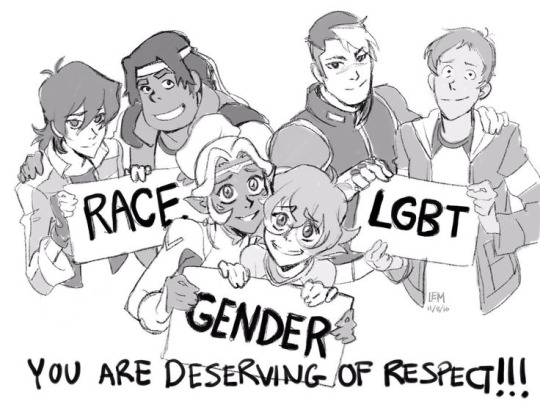
…and claim you’re unaware of how important representation is. Particularly for children, for whom this show was rated as being appropriate for.
I do not feel the excuse that this show was about war is reasonable either. Yes, in real life, war is painful. Lives are lost indiscriminately. This was one of the justifications cited for Adam’s death when VLD was criticized for portraying the “Bury Your Gays” trope. However, VLD had already made it clear that war had costs. The Arusian village was destroyed purposely to bait the team. Several Blades of Marmora lost their lives aiding the team. The costs of war were very clear early on in the show. Allura certainly didn’t have to die to reinforce a theme that had already been reinforced several times prior.
On that note, it is very telling that an apology letter was sent for the death of a character who had all of two minutes of screen time, but not for Allura, a major protagonist.
Many people are offended by Allura’s death, feeling that it is racist and sexist. I do not want to believe that Allura’s death was intended to be either of these things. However, there are serious unfortunate implications in killing off your only WoC in the main cast that cannot be ignored. VLD is fictional but it exists in a real world, where real people are impacted by these issues.
While Allura’s death ultimately feels disrespectful given what she represented and its sheer pointlessness in the story, I see attempts at respect in its overall framing. Allura is revered as a hero. There is a statue built in her honor. She has a legacy. These are things that generally shape the celebration of a fallen hero. But even within the framing, there are mixed signals. Most notably, her loved ones take cheery selfies in font of her monument. In my personal opinion, that is the antithesis to an attempted respectful tone.
And I specifically use the word ‘attempted’ because despite the framing, Allura’s death does not actually come across as respectful in the least. It is crammed into the last nine minutes of the final episode. It is immediately followed by a flash forward to the future. Neither the characters nor the audience have time to mourn her. I do not want to hear the excuse that Allura’s death isn’t offensive because “she died as a hero.” Simply because something may be framed to be respectful doesn’t mean it actually is. The poor execution of that attempted framing itself is one of the lesser of many harmful messages sent by the decision to kill Allura off.
In a world where representation is important, an importance that is acknowledged by the staff, somehow someone still came to the conclusion that Allura’s narrative should end in death. Intent aside, her death falls into the “Disposable Woman” cliche, and is especially gutting because she is a WoC. I cannot reiterate how rare it is to see characters like Allura, non-white women that serve as major protagonists.
Allura suffered unduly throughout the series. She lost an entire planet, her family, her home, her title, and eventually her life. She was always a giving character. She was willing to sacrifice herself to save the Balmera as early as season one. It is noble of her to have that kind of dedication, I’m not saying it isn’t. But girls are socialized to sacrifice their happiness for others, it is a message they internalize at multiple levels.
Girls are socialized to put others before themselves and to sacrifice, and this expectation is especially pressing for girls of color. The SBW (Strong Black Woman) stereotype is a notably prevalent one because of the expectation placed on black women specifically to always be strong and constantly put their own needs last. While Allura is an alien, she is in-universe a minority post Altea’s destruction and IRL, redesigned to be non-white. And many fans, including myself, do see her as specifically black-coded because of her skin tone, hair texture, and having Kimberly Brooks as her voice actress.
A hopeful ending for any character who sacrificed as much as Allura would be one where that character is rewarded for their sacrifice. Where they’re able to find happiness on the other end. Where the audience feels payoff because a character we’ve seen give for so long finally gets. Where the audience feels fulfilled because a character we’ve seen grieve and grieve finally gets to breathe. For kids to see a non-white female character get this kind of ending isn’t only hopeful, but important. Girls— especially girls of color —should be shown that they don’t have to give up everything. Boys should also be shown these narratives, because they shouldn’t internalize the expectation of the girls and women in their lives to constantly sacrifice.
Allura’s sacrifice stands out as particularly glaring when we take into account that teamwork was supposedly one of VLD’s major themes. In a show entitled Voltron: Legendary Defender, wherein the titular robot must be formed by a team, it seems very out of place that it was up to one person to save the day. What was the point of the team bonding with each other, and with the lions, if all of that was going to be rendered useless in the battle that mattered the most?
None of the main characters we’d been led to believe loved each other made any real attempt to find another solution through teamwork. They more or less accepted Allura’s sacrifice at face value even though she was supposedly important to them. The paladins offered some minimal protest, then each gave Allura a hug and just watched her walk to her death. In addition to undercutting the theme of teamwork in the show, it just felt very strange to watch. I didn’t feel like I was watching a team who fought side-by-side at all. These characters felt less connected to each other than they did during the first season and at this point, supposedly they’ve fought side-by-side for years.
Not only did Allura’s lone sacrifice seem to undercut the theme of teamwork, but it just seemed incongruent to the atmosphere of the series. While loss was depicted and prevalent in VLD, nothing ever indicated that it would be a tragedy. Watching Allura’s death play out feels like watching a show that forgot what genre it was supposed to be. The emotional beats aren’t the right ones.
We feel no payoff from her death because it didn’t accomplish anything of value in the narrative. Allura had something to live for after the war, her newfound family and love interest. She didn’t have anything to atone for, unlike Honerva. At best (and I really mean at best here) one could argue that her death contributed to Lance’s development because he spends his life spreading her message after the fact. However, many viewers understandably perceived this as a demotion for Lance with its own set of unfortunate implications. Even if that was the case— which itself feels like grasping at straws for some kind of explanation —I shouldn’t have to point out why it’s extremely problematic for a female character to be killed for her love interest’s development.
Allura’s death felt as pointless as it did out of place. It felt unsatisfying and frankly, just like someone in the writer’s room wanted to be Edgy™ for the sake of it. It also felt particularly mean coming from a team who acknowledged how important representation was to its viewers and who used representation as a promotion point.
VLD is over. That is clear. I do not write this with the intent to get the “real ending” or anything of the like. I write this to express why Allura’s death effected me personally, why I feel it has harmful messages, and why it comes across both as harsh and as poor writing.
I hope all those who were involved with this decision reflect on the feedback from the way her death was perceived, most important the feedback of the WoC in the audience. Major character death should always be handled with care, especially in children’s programs. Representation should always be handled with care, especially in children’s programs. The way Allura’s story ultimately ended feels careless at best and malicious at worst.
Signed,
An Incredibly Disappointed Viewer
63 notes
·
View notes
Text
Joel’s Inferno
So I just cooked up this ludicrous Game Theory-tier speculation comparing The Last of Us to Dante’s Inferno and now all I can do spread it around for whoever cares to see. It’s long as fuck so I’ll put it below a cut. I don’t think it actually has any basis in the devs’ intent but it was a fun thought exercise and made more sense the more I wrote. Gets real melodramatic at the end. Waste your time reading it at your own risk.
Playing through the game recently I began to think about how the story is constructed and how a progression of events leads the characters to their eventual conclusion. Essentially, it occurred to me that Joel and Ellie endure a series of increasing hardships which tests and strengthens their relationship before ultimately emerging on the other side together. The thought came to me that this could be compared to a story like Dante's Inferno, where the hero descends into Hell and experiences its worst depths before returning.
Then I started to wonder, could the game's events be directly compared to the nine circles of Hell? For those who don't know, the poem Dante's Inferno depicts Hell as being made up of nine circles, each corresponding to a sin and getting worse (both in terms of the sin and the punishment for the sin) as they go lower. I decided the most fitting way to compare them was for each circle to correspond to people Joel and Ellie meet on their journey.
Keep in mind this is just a thought experiment. As you'll be able to tell from how far many of these had to be stretched to fit, I don't think it was intentional. But I still thought it was an interesting concept.
Limbo: the first circle of Hell, for those who did not sin enough to be damned but also didn't accept God in order to be saved. Among them are unbaptized children, too young to know God but too innocent to go to Hell. This is the prologue of the game, ending with the death of Joel's daughter Sarah, and thus Joel's entry into Hell.
Lust: The early part of the game with Tess. Tess chooses to die out of dedication to the cause of Ellie and her immunity, and Joel initially continues escorting Ellie only in honor of Tess and their partnership together. Notably, one of her last lines is “Look, there's enough here that you have to feel some sort of obligation to me.” What “enough here” exactly means is never made explicit, and they may only have ever been fellow smugglers, but it's clear that at the time when the game begins Tess is the person Joel cares about most. This “obligation” between a man and a woman is the closest the game comes to depicting Lust, and it leads to Tess's death.
Gluttony: Bill's town. Bill is the fattest character in the game (possibly the only person with an out-of-shape build in the entire game, actually), a characteristic which Ellie derisively comments on during their scenes together. Fittingly, this is also where Joel first encounters a bloater, the name of which speaks for itself (and is ironically fought in a high school gym). While obesity may not seem like Bill's most notable flaw, it indirectly symbolizes the isolation and paranoia that defines him, as his reliance on traps to keep others away and do the fighting for him would allow him to avoid exerting himself more than necessary and his careless appearance suggests his disregard for the conventions of outsiders.
Greed: This is Sam. Though not greedy in the traditional sense, Sam shows a form of greed by desiring more than he should in the scene where he attempts to pick up a toy, for which Henry rebukes him with the saying “We only take what we have to.” This greed is a shorthand for the flaws Henry sees in Sam, which Sam is insecure about. These arguments lead Sam to resent his brother and cause him to hide his infection when he is bitten. His final activity before death, counting cans of food while the others are relaxing, demonstrates an opposite form of Greed to that of the toy scene. Sam hordes these items not because he personally desires them but because he thinks his brother will approve, a reversal which is reinforced when he despondently throws away the same toy after Ellie brings it to him.
Wrath: Henry. Henry is characterized largely by his unhappy relationship with his brother, who he views as disobedient and incapable and who he frequently criticizes for his errors. Though this behavior is motivated by love for his brother, whom he wants to keep safe, Sam only sees it as anger. He also first meets Joel and Ellie when he attacks them on sight, and is occasionally aggressive when Joel expresses doubt toward him. His last words are spoken in irrational anger, blaming Joel for the death of his brother before killing himself.
Heresy: Tommy, who Joel goes to in hope that he will bring Ellie to the Fireflies, only to find that Tommy abandoned their cause a long time ago (making him a heretic to their “faith”) and has taken up his own community (whom Joel mockingly refers to as “born again,” a phrase with religious associations). While Marlene can be heard in the opening credits telling people that “When you're lost in the darkness, look for the light,” suggesting the Fireflies as saviors, Tommy has found his own source of light – the electricity produced by the dam his community has restarted. Joel also says his split from Tommy was due to a difference in worldviews (which is reinforced during their argument, where Tommy says they “ain't back in Boston” and that his time surviving with Joel “wasn't worth it”), making him a heretic from Joel's way of life as well.
Joel himself shows a sort of Heresy during this section by attempting to leave Ellie behind, representing a trial of his own “faith” — his love for his daughter. The picture Tommy provides him of his daughter (which he turns down much like he is trying to send away Ellie) is the most obvious suggestion of the connection between the two up to this point. Toward the end of the section with Tommy, Joel at first appears to completely abandon his bond with her by telling her “You're not my daughter, and I sure as hell ain't your dad. And we are going our separate ways.” However, he resolves to stay with her shortly after, claiming that he is afraid of Tommy's wife and encouraging Tommy to stay with her and his community. In a sense, Joel attempts to restore Tommy's faith in his cause in order to escape the difficulties of his own, but he ultimately chooses to be faithful himself and let his brother remain a heretic.
Violence: David. David's section of the game contains four significant instances of violence (which is saying something, for a game as generally violent as this one). First is Joel's impalement, which occurs during Fall but was caused by combat with bandits who David later reveals are part of his group. Second is the revelation that David and his people are cannibals, a form of violence even further than anything seen up to this point, which connects them moreso with the infected than with other humans. Third is Joel's torture and killing of two of David's men, perhaps the first time we truly see extent of the brutality and even cruelty Joel is capable of. Lastly is Ellie's killing of David, an act so violent it isn't shown on screen and the trauma of which seems to finally seal her and Joel's devotion to one another. It also acts as counterpart to Joel's earlier violence, showing the great lengths both will go to when the other is in danger.
Fraud: Marlene and the Fireflies. From Joel's perspective, their choice to kill Ellie is a betrayal. This is fairly clear-cut; while they promise to help humanity, Joel can only see them as trying to destroy what he loves most, making them dishonest in his eyes. Joel also sees Marlene as breaking her promise to Ellie's mother to keep her safe. The Inferno classifies the worst frauds as “Falsifiers, those who attempted to alter things through lies or alchemy, or those who tried to pass off false things as real things.” Joel sees the Fireflies as unworthy heroes for humanity (impostors), trying to convert a girl's life into a cure (alchemy/counterfeiting). Just as these frauds are punished with disease in Hell, Joel massacres the occupants of a hospital, doctors included, takes away the only hope for a cure and condemns humanity to the cordyceps plague.
Treachery: The last circle and the worst sin, Treachery, is embodied by Joel himself. In the final scene he lies to Ellie about what happened with the Fireflies — a lie which Ellie may or may not recognize, but which marks a point from which they can never return, the final stage in their relationship. Before questioning Joel's story and making him swear it is the truth, Ellie tells him about how her friend Riley told her they would die together after being bitten, but as Ellie puts it, she's “Still waiting for [her] turn.” Both Riley and Joel have told her lies, but where the former was an effort to reassure her told out of ignorance of the harsh truth, Joel's was created with full awareness of what really happened and serves his own purposes more than Ellie's.
In trying to protect her from the trials of Hell, Joel's love for Ellie ultimately condemns him to its lowest depths.
Much like in Dante's Inferno, the successive layers of Hell are each reserved for worse sins. Sarah is the most innocent and nonthreatening character in the game; Tess, though capable of violence, is clearly a devoted ally to Joel; Bill is also an ally, but of a more begrudging kind; Sam and Henry are both friendly but unfamiliar, not entirely reliable and eventually self-destructive; Tommy, though by no means hostile, outright refuses to uphold Joel's request at first while Sam and Henry had been eager to cooperate; David pretends to be friendly but turns out to be an unhinged antagonist with some particularly reprehensible traits; the Fireflies are far more sympathetic and civilized but want to kill Ellie immediately, whereas David was obsessed with keeping her alive. Finally, the player realizes that all along they have been controlling the most dangerous character of all — and as our control shifts to Ellie in the last scene, we know he will never let us go so long as he lives, for better or for worse.
4 notes
·
View notes
Text
when the lamp stays unlit
a multi-part anon that’s been waiting awhile:
...I never really fully thought of shiro as physically disabled... he had a fully functional prosthetic arm with all the motor skills of a real arm plus superhuman strength and so forth AND because it didn’t really impair him. It would be one thing if he was physically disabled and the show thus normalized disability; but to me, Shiro‘s arm (and Ezor‘s fake leg and Zethrid‘s missing eye) were more like sci-fi ‘cool battle scars’ rather than things that really impacted their social or emotional life. [...] The missing arm made [Shiro] more incapacitated during s7 (I guess?) but it was an excuse for benching him, which is something I found ableist. And while he has a mental illness as well, I thought it only ever became an issue when it was convenient to the plot. Hope that made sense, it wasn’t my intention to be insensitive since many people see him as great disability rep.
This is nearly as difficult a subject as race, but it’s also an important discussion to have. We do need the conversation about LGBT+ representation in VLD, but it’s drowning out an equally important conversation about how disability is represented (and treated) in popular media.
As a caveat, I’m a work in progress when it comes to un-learning the ableism that permeates Western culture, even when directly harmed by its perpetuation. So I’m inviting anyone with the spoons and lived experience to join in. The more voices and perspectives, the better.
Behind the cut: clarifying a few terms, how the SFF genre conceptualizes disability, how humans conceptualize difference, narrative treatment of Shiro as disabled, and PTSD/mental health in popular media.
First, let’s define some terms so we’re on the same page. Assistive technology “increases or maintains the capabilities of people with disabilities.” Adaptive technology (a subset of assistive) is tech “specifically designed for persons with disabilities and would seldom be used by non-disabled persons.” Gadgets like sock cradles are assistive, since an abled person might use them; a prosthesis or screen reader would be adaptive. The majority of media representations of disability will use adaptive technologies to signal a disability, rather than assistive. (definition from wikipedia)
Now for a few lesser-known terms. There’s a philosophical concept concerning the breakage of things we’ve always taken for granted. Like flipping a light switch: the light goes on. We don’t pause to marvel over what made the lightbulb glow. Then one day, you flip the switch and the light doesn’t come on. Now suddenly you have to stop and notice something that previously you’d never given much attention.
This sudden awareness of wrongness --- the light not going on --- takes three forms. It can be conspicuous, where it’s visibly damaged, ie the lamp is smashed. It can be obtrusive: a part is missing, ie there’s no bulb in the socket. Or it can be obstinate, ie the bulb and lamp are fine, we just don’t have power.
The abled perspective --- when suddenly reminded of disability --- is to see the disability as conspicuous and obtrusive. That is, broken and incomplete. Which means, that’s the only story the abled perspective knows, so that’s the story it tells, over and over.
It’s a common assumption, especially in the SFF genre: adaptive technology removes a character from the category of disabled. Cybernetic modifications or prostheses become design elements; the character is considered --- and written --- as abled. In a sense, the character is like the lamp when there’s power: the author can ignore the label of ‘disability’ and carry on without giving more thought to the issue.
But if there’s removal (or breakage), for the author, it’s like flipping a switch and the light doesn’t go on. You can almost hear the author thinking: ‘oh, forgot this character can’t do anything.’ Until the story provides repairs or replacement, the previously adaptively-abled character is now un-abled.
Disability --- in the absence of adaptive technology --- is, at best, obstinate. The character is neither broken nor incomplete; they’re a lamp without a power source. Nothing else has changed. But if someone never gave thought to how lamps need power to operate, their first reaction won’t be to ask if the power’s out. It’ll be to check the lamp, the bulb, the wiring, and declare it mysteriously broken because no light is happening.
Abled writers effectively shift the blame onto the lamp: it’s now useless, by some ill-defined sense. But it’s not; it hasn’t changed. It was reliant on power when power was available, and it’s reliant when power’s not available, too.
The analogy itself is already too simple for the reality; it implies a person could be abled/disabled as on/off. So let’s adjust, and say: the lamp has a solar-power backup and still lights up --- just not as quickly or brightly. Or it’s a drill whose battery needs recharging: it’s still usable as a manual screwdriver, awkward but workable. Plus, the base is still handy as a makeshift hammer.
The presence of any given disability does not automatically mean the person is fully dis-abled by all other measures as well. Analogies only go so far, after all.
But this is the main point: the character never stopped being disabled, any more than the lamp stopped needing power. By that same token, the person who takes medication for ADD isn’t ‘cured’ with medication, anymore than a paraplegic stops being unable to walk just because they have a wheelchair.
Now that I think about it, this could extend to just about any representation one doesn’t experience personally. I mean, we do it to each other: “behind the grill, she’s one of the guys.” And then we see the person after work in a dress and heels and we’re reminded she was a woman all along; we were just setting aside her gender because we could ignore it. Like the light switch we flip unthinkingly, we paid that detail no mind.
And the fact is: it doesn’t matter if an onlooker judges a trait as irrelevant. The person still has that gender, religion, ability, sexuality, ethnicity, age, etc. When we aim to be colorblind, or genderblind, or sexualityblind... it’s like having a lamp that won’t go on and not realizing electricity is required. We’re blind to half the picture, so we blame the lamp, not the absence of power.
We’re forgetting that because we can ignore her gender doesn’t mean she can. Or even would. But so long as we can, we’ll miss all the ways her reality informs her experiences.
You’re right that benching Shiro in S7 was an ableist move. The entire season makes evident how little thought the staff has afforded Shiro. To them, he was abled, now he is not, and this radically changes everything: no longer a paladin, not even a pilot, nor even on the front lines (and when he is, he loses). As @caramelcheese pointed out, Shiro’s fought with both hands tied behind his back. Lacking one arm shouldn’t slow him down in the least.
Others have written at length about Shiro’s new prosthesis. They’ve raised practical issues with a floating arm, such as imbalance and center-of-gravity, and ethical issues such as the offensiveness of a design that echoes his tormentor’s signature detail, so I won’t belabor those here. To me, there are two aspects even more insidious.
One is caused by narrative silence on Shiro’s changed status. Shiro’s only visible difference is the loss of his prothesis; the narrative fails to address this, let alone provide any other explanation. Narrative silence becomes tacit confirmation: an amputee cannot be a hero.
The second is the dehumanization. Before S7, in casual dress, Shiro’s arm was evident; in armor, he was no more marked than anyone else. His expulsion from being a paladin is visually reinforced by his loss of the Black Paladin’s armor; the Garrison uniform and space suit are modified to be constant reminders that Shiro is disabled. There is empty air where his upper arm would be.
His redesign marks him as literally incomplete.
As for mental health, we can’t discuss Shiro’s PTSD in a vacuum, when it’s a part of so many kids’ lives. Some suffer PTSD themselves from first-hand trauma, and likely many more suffer it along with their parents as a result of the US’ anti-immigrant attitudes. The hardest hit may be military kids between 8 and 18, of whom roughly one in five has a parent who suffers from PTSD.
Shiro had to have been a powerful figure for those kids. He had onscreen panic attacks and flashbacks, yet remained a hero in the story and to his team. His PTSD-inflected moments may have served the plot, but those also worked to keep present the continuing damage from his trauma. More importantly for younger viewers, he laid a hero’s narrative over the sometimes terrifying reality of a family member who suffers from PTSD or related trauma.
S3 left that behind, turning Shiro’s trauma into headaches, and even that much mentioned rarely. By S7, no signs of PTSD remained. The EPs’ tone-deaf explanation --- that Shiro learned to grit his teeth and just deal with his trauma --- was a horrific betrayal of the audience who related to Shiro. Willpower has never been a viable cure for mental illnesses or trauma.
One ingredient for healing from PTSD is support and love from a strong network of family and friends, and it’s ironic the series’ only example of a healing moment was the DnD episode. It allowed Shiro/Kuron to create and role-play a new story for himself, in a safe environment, surrounded by the support of people who mattered most to him. When Shiro/Kuron tells Coran that he feels better after playing, it’s one of the rare grace notes in the story: because that would be a healing experience for someone with PTSD.
Shiro’s story undergoes an odd reversal. He begins the story treated as though he’s abled, yet mentally traumatized. By S7, the story considers him disabled yet also fully ‘over’ his PTSD. He went from conspicuous and obtrusive for his PTSD, to conspicuous and obtrusive for being an amputee.
After thinking about it, I wonder if perhaps it’s because once the lamp has been broken for long enough --- regardless of the reason --- it eventually becomes yet another thing we don’t think about. Just like once, perhaps as children, we found light switches fascinating and the lamp going on/off to be worthy of deep thought, eventually we learned to pay it no mind.
Perhaps Shiro’s reversal is yet another indication of an abled creator who doesn’t understand the obstinate nature of disability. We have some backwards notions about illness, in the US, and one of them is that illness is a moral failure. Like, if you just tried hard enough, you’d be better. Any disability for which there’s no cure --- you can’t regrow an arm, after all --- thus renders the person both permanently broken and morally inadequate.
And, apparently, not worthy of being a paladin.
#vld#voltron#disability#representation#characterization#sol thinks about stuff#random existentialism terms#come for the sugar stay for the salt
115 notes
·
View notes
Text
OUTLANDER Outlander Season Finale: Who Are the “Men of Worth” in Season 4? by Natalie Zutter www.tor.com
After last year’s Outlander finale, which literally shipwrecked Claire and Jamie onto the shores of America, I was expecting a bigger cliffhanger ending to this season—that the letter the redcoats delivered to Jamie at River Run would be conscripting the poor Scot to fight on their side in the American Revolution. Then I remembered that it was only 1770, and that the next big war was a few years (or, I’m going to assume, one season) away. Instead, the season 4 finale, filled with resolutions both neat and messy, ends on Jamie getting a much more pressing, one-on-one assignment that reemphasizes this season’s enduring question: Can a good man do a bad thing and remain a “Man of Worth”?
Spoilers for Outlander season 4.
The thing is, it’s difficult to care too much about Jamie being ordered to hunt down Murtagh on behalf of Governor Tryon, because it seems too obvious that, between the two of them, they’ll be able to come up with a solution. That could mean faking Murtagh’s death or smuggling him back to Scotland, and thus away from Fraser’s Ridge, which would carry its own bittersweet heartache, but it’s not as if there’s an ideological chasm between them—hence the low stakes. It also seems a far-off problem when this season was more than a little uneven, and I’m still working through my frustrations with how the Brianna and Roger plots shaped the latter half of the season.
So, what feels like the most appropriate way to send off Outlander season 4 is to return to the theme linking the past thirteen episodes—good men doing bad things, bad men doing things that might have positive ramifications despite their intent—and reexamine the worthiness of Outlander’s men.
Jamie: If I were Jamie, I would be feeling like a right arse by the end of this season. First he helps outlaw Stephen Bonnet escape, out of a misguided sense of goodwill toward a fellow immigrant in this new country, only for that to blow up spectacularly in his face. Of course, he has no way of knowing how the consequences of his act of charity will lead to his daughter getting raped by Bonnet, but it’s a sobering lesson in the dangers of believing the best of your fellow man. Then Jamie swings to the opposite end of the spectrum by assuming that Roger is the one who violated Brianna, beating him senseless without taking a breath to consider, to question the circumstances, propelled by pure rage. Brianna is rightfully furious at him—and they have one of the best moments of the season, when Jamie screams and kicks a chair in frustration and Brianna snaps, “No! You are not allowed to be angrier about this than I am.” He’s clearly wrestling with so much self-loathing that, after twenty years of maturing and growing beyond the hot-headed lad he was when he met Claire, he has regressed back into an impulsive thug.
But Jamie has also learned self-awareness in the intervening decades, as he demonstrates in his incredible scene of vulnerability, asking Claire if she and Bree think that Frank was the better man. He got the girl—she went back in time for him—and he still doubts that he’s good enough. Sam Heughan has brought so much depth and nuance to a character who could have stayed a one-dimensional fantasy; watching James Fraser grow up has been one of the series’ greatest delights.
Roger: On the one hand, Roger endures indescribable pain and suffering as a slave of the Mohawk—the worst possible time travel experience, all because of a misunderstanding he was only partly to blame for. On the other hand, every time he’s offered the chance to be the good guy, he finds a way to be unlikable. Slut-shaming Brianna for being unsure about marrying him as a virgin was difficult to watch, especially considering that the next time they see each other, she was the one to compromise her comfort and pledge her life to him because of his unwillingness to budge. He reiterates multiple times that he had the chance to leave and kept coming back for her, but we only hear that through his telling, which casts him as some romantic hero. At the last minute of the episode he comes riding in on a horse, for crissakes, but that’s more than a day after Jamie and Claire return to River Run, believing that Roger was unwilling to join them.
Again, these are the kinds of choices one would not wish on anyone—such as being told that there is a good chance that Brianna’s baby is not his, and that to honor the terms of their handfast would mean committing to raising that child and spending the rest of his life in the past. If anything, as much as their plotline aggravated me, at least it forced constraints on Roger’s decision, instead of him getting to set the stakes. Roger is not a bad man, but he has demanded a lot of Brianna; I’m curious to see them build a more equal partnership going forward.
Stephen Bonnet: I’m still so impressed with how Bonnet went from charismatic stranger to fatal threat in the space of one episode, and how just a few acts of specific cruelty did so much to change the course of the Fraser family’s lives. Considering how we witnessed his turn in the premiere, it was difficult to muster up any real sympathy for him when Brianna confronted him with her emotional speech about how her child would be nothing like him. Offering up the ruby seemed like a rare moment of vulnerability for the criminal, but I suspect that was more of a formal obligation to contribute one positive thing to this bairn’s life than any regret for raping Brianna in the first place. Also, I’m not convinced that he perished in that prison, and am half-expecting that he will reappear, cockroach-like, next season to kidnap the baby that might be his.
Brianna’s son: Just born, and as far as I remember they did not mention his name. So, for fear of revealing the few book spoilers I stumbled upon in my research (ironic, I know), I’ll just reiterate that he’s a wee fighter and not tack on “like his da” since we are just ignoring his paternity. It was clear, though, that Bree was anxious to meet the little guy, in case she somehow saw Bonnet reflected in his face, but that upon taking him in her arms she was relieved to feel nothing but overwhelming love.
That said, from the moment that Brianna decided to keep the baby, there was no saving her plotline for me. But that’s a discussion for another piece.
Young Ian: I can’t feel anything but oddly maternal pride upon witnessing Ian’s character growth, particularly in this season but even stretching back to when he dragged his poor uncle and aunt across an ocean to save his overeager ass. The season premiere saw him grappling with the trauma of being raped by Geillis, of shaping his identity around what happened to him while not letting it define him; concurrently, he’s learned how to make himself a useful member of Fraser’s Ridge. Sure, offering to marry Brianna was classic dumb Young Ian; selling Roger to the Mohawk was nigh unforgivable. But he more than made up for it by offering up himself in Roger’s place, to live among the Mohawk and replace their dead member. Honestly, it was about time that Ian learned who he was without his blood relations there to protect him. And look how he made it through the gauntlet! That’s our boy.
Murtagh: It’s fascinating to see how the writers fit Murtagh into the narrative, considering that the character is kinda living on borrowed time—that is, he’s long-dead in the books, but they spared him in the adaptation. His and Jamie’s reunion in Wilmington scratched one of my narrative itches—that prolonged moment in which two souls, separated by time and distance, slowly recognize one another while the viewer is screaming omg, hug already!! But now not only are they caught up on the last decade-plus of each other’s lives, but they also recognize that they have landed on different sides of a growing conflict, due to their respective definitions of self-preservation. I’d like to see the series delve more into this next season, to really make it an impossible choice for Jamie.
Side note: Murtagh and Jocasta’s argument-turned-hookup, complete with her throwing whiskey in his face, was amazing.
Fergus: Under-utilized this season, stuck in Wilmington and mostly just reacting to the plot action when it comes to him. What would make Jamie’s dilemma more affecting would be if Fergus (who, it’s been established, can’t find work anywhere else) joins the regulators in earnest—making it twoloved ones that Jamie is contractually bound to hunt down.
Otter Tooth: The initial discovery of Otter Tooth’s skull made it seem as if he and his silver fillings would play a larger role in the season. While at first it was a surprise that it took only half of an episode to lay out his story, it also speaks to the utter tragedy of the failed time traveler. Unlike Claire, who finds a willing believer in Jamie when it comes to Culloden and other predictions of the future, poor Otter Tooth could not convince enough of the Mohawk to heed his warnings about the Iroquois being forgotten. Instead, he was branded a madman, hunted down, and forced to haunt this time and place, unable to bring about the change he so desperately wanted. Moreso than almost any other plot this season, it’s a thought-provoking story that Diana Gabaldon included, and the writers adapted. Plus, the post-credits visual of him in his present watching the two white boys play Cowboys and Indians was wrenching, and one of the series’ best of these little moments.
Lord John Grey: Poor Lord John puts up with a lot this season, mostly in the form of the daughter of the man he loves blackmailing him into marrying her, lest she out him to everyone. But this is the man who maintained affection for Jamie even after being friendzoned, who has proven over and over that he will put his own desires behind those of a child in need of a father, or a pregnant woman who will be dishonored without a husband. LJG is good people.
William: What a fierce, pouty li’l jerk. It’s too bad that we weren’t treated to the narrative weirdness of William’s half-sister Brianna becoming his stepmother, but perhaps he’ll reappear in future seasons.
Lesley: To be honest, I had barely registered him before he got his throat slit by Bonnet, but nobody deserves a death like that. RIP.
Frank: FRANK. His one cameo this season, in a number of revelatory and gutting flashbacks, was the perfect way to bring him back—especially since we see him through Brianna’s eyes, after years of him refracted through Claire’s perspective. But even Brianna doesn’t realize how many complicated feelings it layers on top of Frank’s motivations to know that he had the obituary the whole time and never let on to Claire that he knew about her supposed death. Not that I blame him, considering how she treated returning to their marriage as a consolation prize, but still.
George Washington: Presumably, but we only got a few scenes with him. I’m looking forward to (hopefully) more of the would-be President next season.
Rollo: Very Good Boy. Very glad he made it through the season and will accompany Young Ian on this new adventure.
3 notes
·
View notes
Text
Dominant and submissive Agreement
This document serves as an agreement which defines in specific terms the power exchange relationship and interaction between two individuals, hereafter termed the submissive and the Dominant. This agreement is only binding between the two people signed below. This agreement is entered voluntarily with both parties agreeing to the conditions.
This agreement is intended to guide the two individuals on their journey together, and while the primary intention is to please the Dominant, it is also intended to shape the submissive into a better, happier, and stronger woman, and to help the couple grow together spiritually, lovingly, mentally, and physically. This agreement shall serve as the basis for an extension of the relationship, committed to in the spirit of loving and consent. Dominance and submission with the intention of furthering self-awareness and exploration, promoting health and happiness, and improving both our lives.
This contract has a life of 6 months. At its expiration a new contract may be created and signed.
Section I: The Dominant’s role
a) The Dominant agrees to care for the submissive to include tending to the physical safety and emotional and mental well-being of the submissive as long as He owns the submissive.
b) The Dominant also accepts the commitment to treat the submissive properly, to train and discipline the submissive, punish the submissive, love the submissive, and use the submissive as He sees fit.
c) The Dominant accepts the responsibility to use His power to mold and shape the submissive, assist the submissive to grow in strength, character, confidence and being, and to help her become a better woman in all areas of her life.
d) The Dominant will not ever purposefully ignore the submissive.
e) It shall be the Dominant’s duty, with applicable assistance from the submissive, to watch for and prevent any mental or emotional trauma which may stem from the condition of servitude, activities within the condition of service, or any other variable that is based within the confines of this contract.
f) The Dominant will be faithful to the submissive, and will be honest and loyal to her at all times.
g) The Dominant will always be open to the submissive’s concerns and thoughts, worries and stresses, and will encourage her to always open up and express her feelings and concerns to Him without fear of punishment.
h) The Dominant agrees to not submit the submissive to a session when he might not be in the proper frame of mind to administer it.
i) The Dominant will always support the submissive through encouragement in her relationships with family and friends as well as through her career.
j) The Dominant will not keep the submissive or their relationship isolated from other aspects of his daily life.
Section II: The submissive’s role
a) The primary purpose of the submissive is to serve, obey, and please the Dominant, in a manner seem fit by the Dominant.
b) The submissive will put her entire trust into the Dominant with the knowledge that He will never betray that trust.
c) The submissive shall follow rules, rituals and guidelines as established by the Dominant, with the understanding that breaking a rule, ritual or guideline will lead to some form of punishment as dictated by the Dominant.
d) The submissive agrees to follow the direction and commands from the Dominant both in and out of the bedroom.
e) The submissive will always respond to the sexual needs of the Dominant at any time in any manner that he sees fit, unless responding to His needs violates any other aspect of this contract. This includes engaging in sexual activities with the Dominant that might be outside of her comfort zone but she will do them as they please him.
f) The submissive will be faithful to the Dominant and will be honest and loyal to him at all times.
g) The submissive will at all times act in a manner that is respectful of the Dominant, to include manners of speech, promptness, proper answers, obedience, loyalty, and honesty, with the understanding between both of them that the submissive shall not have to necessarily alter her personality.
h) The submissive will take proper care of her body in a manner that is pleasing to the Dominant and with guidance from him if necessary.
i) If the situation feels warranted by the Dominant, the Dominant may demand the submissive make other adjustments to lifestyle.
j) When not in His presence, the submissive will maintain regular contact with the Dominant, to include informing Him of her schedule and activities. Regular contact is to include phone calls, text messages, or emails. The submissive will do everything in her capacity to respond promptly to all communications from the Dominant, and must never make the Dominant feel ignored by her.
k) The submissive will not keep the Dominant or their relationship isolated from other aspects of her daily life.
l) His reliance on safewords obligates me to use them and I Promise to do so. I will use “yellow” as a warning word to request that the Dominant slow down, ease up, or change direction while continuing the session. I will use “red” to immediately end a scene or session
m) Additionally, the submissive agrees to the following:
a. To strive to overcome feelings of guilt or shame, and all inhibitions that interfere with her capability to serve the Dominant and limit her growth as his submissive
b. To reveal her thoughts, feelings, and desires without hesitation or embarrassment
c. To inform the Dominant of her wants and perceived needs, recognizing that he is the judge of whether or how these shall be satisfied
d. To strive toward maintenance of a positive self-image and development of realistic expectations and goals
e. To work with the Dominant to become a happy and self-fulfilled individual
f. To work against negative aspects of my ego and my insecurities that would interfere with advancement of these aims
Section III: Other Partners
The Dominant understands that the submissive entered the relationship with a Polyamorous tendency. The submissive agrees to discuss any potential partner with the Dominant and develop acceptable boundaries to remain true to the Dominant/submissive relationship created in this agreement.
The Dominant expresses desire and interest in the submissive having other intimate partners. The Dominant agrees that any intimate partner of his choosing must agree to all hard limits and treat submissive with respect and respect of the Dominant and submissive’s relationship. The submissive agrees that any intimate partner of her choosing will treat her with respect and respect of the Dominant and submissive’s relationship and accepting of the boundaries established by the Dominant.
The Dominant agrees that any partner for himself will be discussed in advance with the submissive and will develop acceptable boundaries to remain true to the Dominant/submissive relationship created in this agreement.
Section IV: Limits
The Dominant and submissive have discussed and provided one another a listing of hard limits. It is agreed upon that these limits include no permanent marks or piercings, no permanent bodily harm, no illegal activities or any play involving children or animals, no play involving blood, scat or direct fire.
Section V: Punishments
The submissive and the Dominant agree that appropriate punishments are necessary for the growth of the submissive. Punishments are dependent on the severity of the infraction. Punishments will be used to change the behavior and remind the submissive of this agreement.
Dominant will inform submissive that she is being punished when punishment occurs. He will explain the reason for punishment either before, during, or following punishment. The Dominant agrees to discipline only out of a desire to better the submissive, and further agrees to never punish out of, or during, feelings of anger.
Section VI: Alteration of contract
This contract may not be altered, except when both Dominant and submissive jointly agree. If the contract is altered, the new contract shall be printed and signed, and then the old contract must be destroyed.
Section VII: Termination of Contract
Should either Dominant or submissive find that their aspirations are not being well served by this agreement, find this commitment too burdensome, or for any other reason wish to cancel, either may do so by verbal notification to the other, in keeping with the consensual nature of the agreement.
We both understand that cancellation means a cessation of the control stated and implied within this agreement, not a termination of our relationship as friends and/or lovers. Should the relationship as lovers and/or friends terminate, this agreement becomes null and void.
Upon cancellation, each agree to offer the other their reasons and assess our new needs and situation openly and lovingly.
Section VIII: submissive’s signature
With a free mind and open heart; do request of Dominant that he accept the submission of my will unto him and take me into his care and guidance, that we may grow together in love, trust, and mutual respect. The satisfaction of his wants, desires, and whims are consistent with my desire as a submissive to be found pleasing to him. To that end, I offer him the use of my time, talents, and abilities.
My surrender as a submissive is done with the knowledge that nothing asked of me will demean me as a person, and in no way diminish my own responsibilities toward making use of my potential.
Signature____________________________________________ Date_______
Section IX: Dominant’s signature
I have read and fully understand this contract in its entirety. I agree to accept this submissive as my property, and to care for her to the best of my ability. I shall command her, train her, love her, and punish her as a submissive. I shall always treat her with respect. I understand the responsibility implicit in this arrangement, and agree that no harm shall come to the submissive as long as she is mine.
Signature____________________________________________ Date________
0 notes